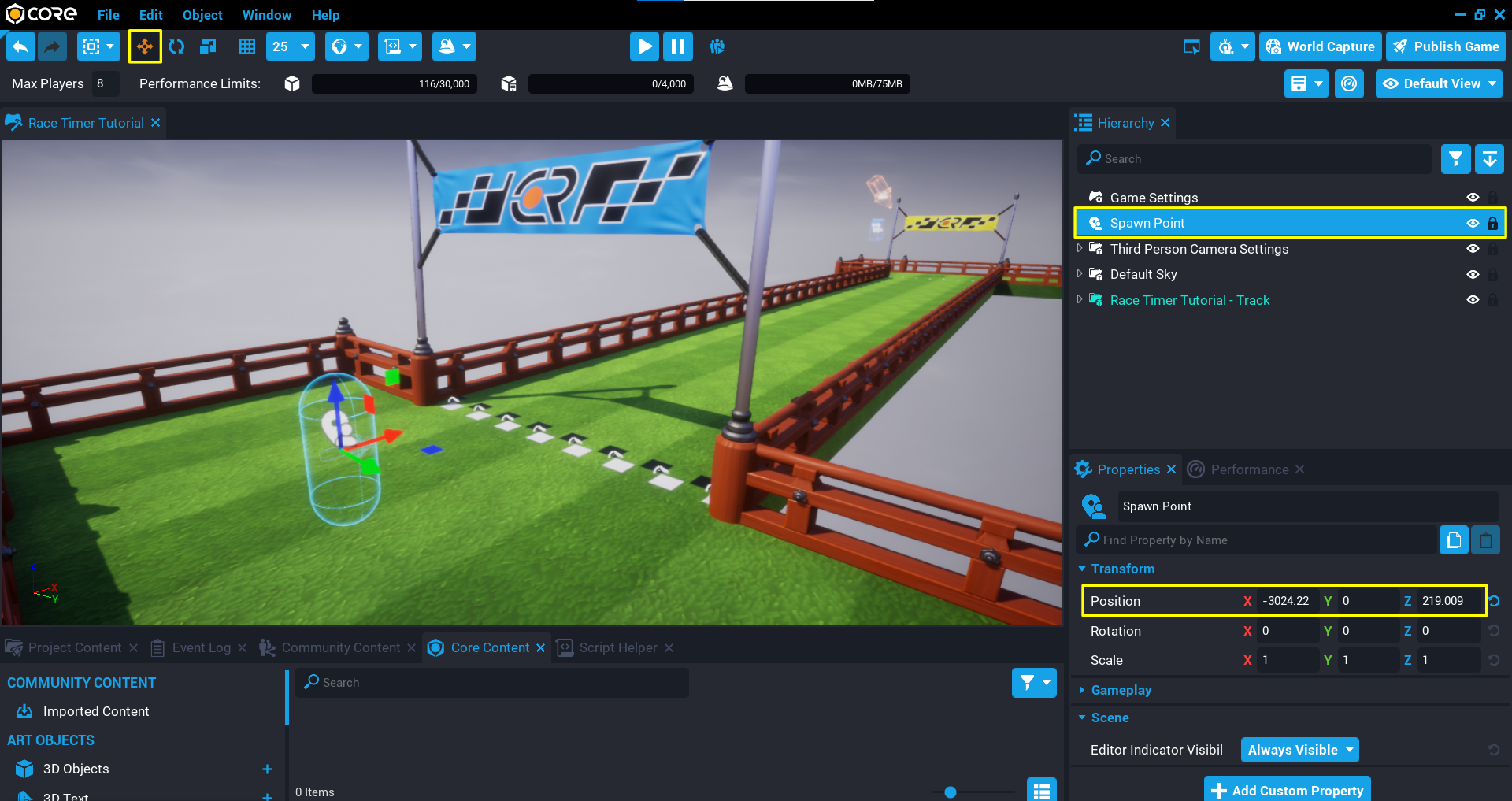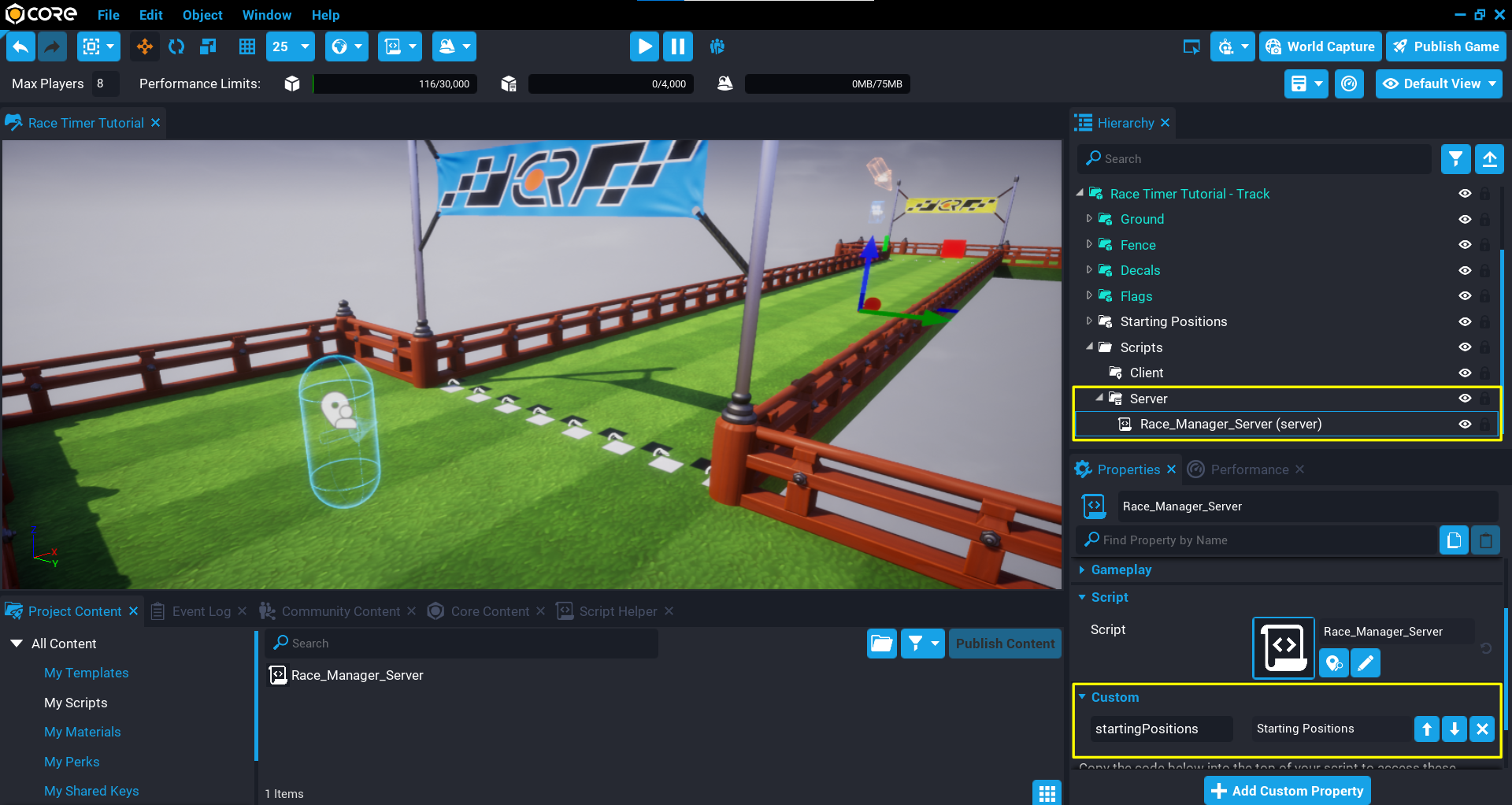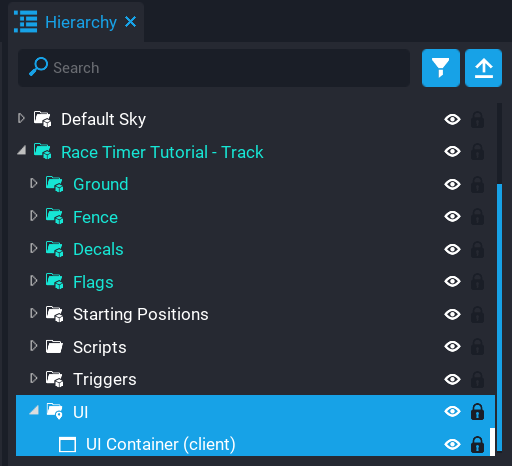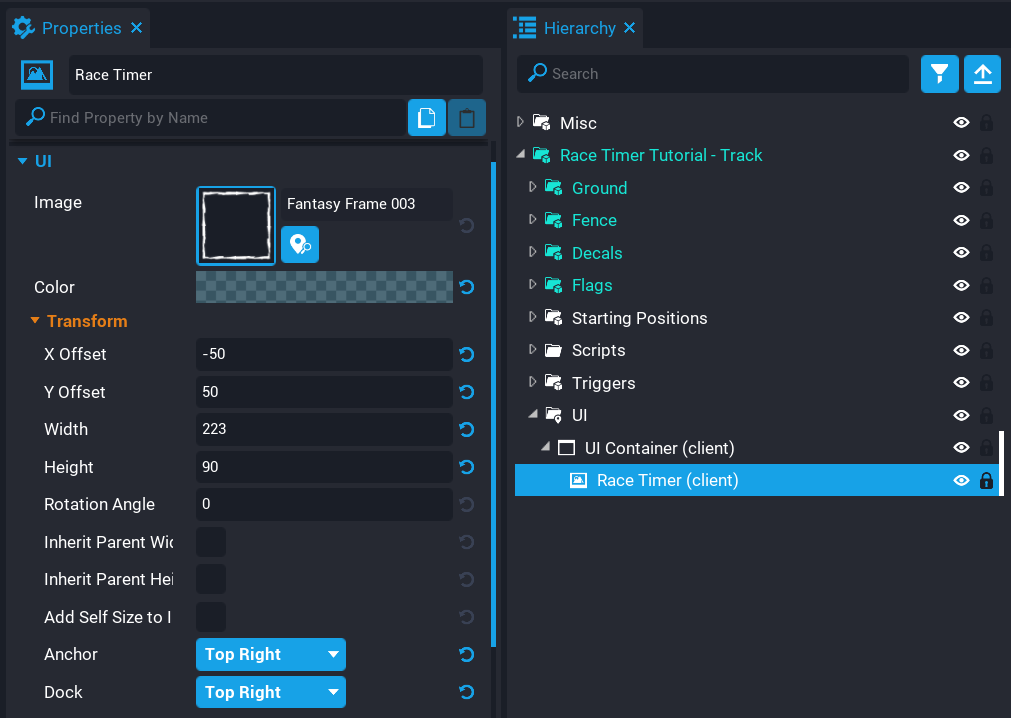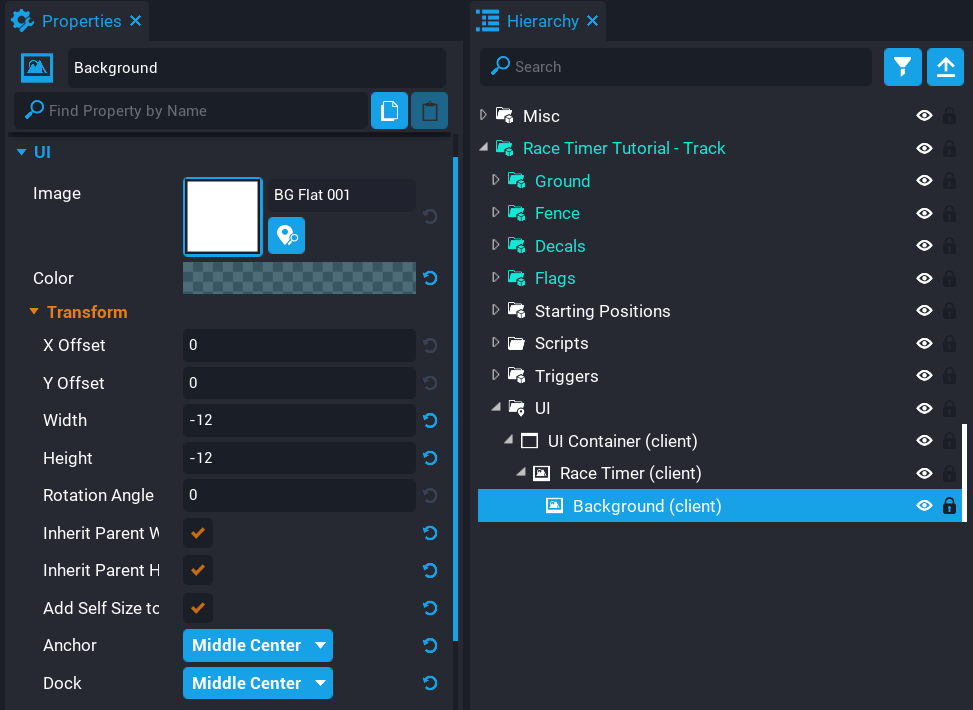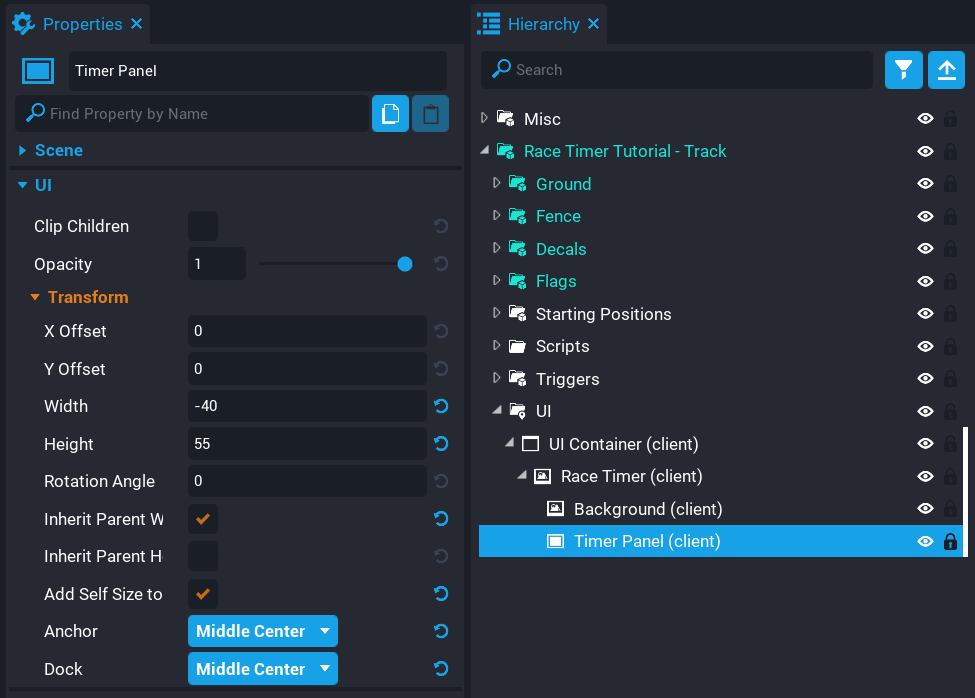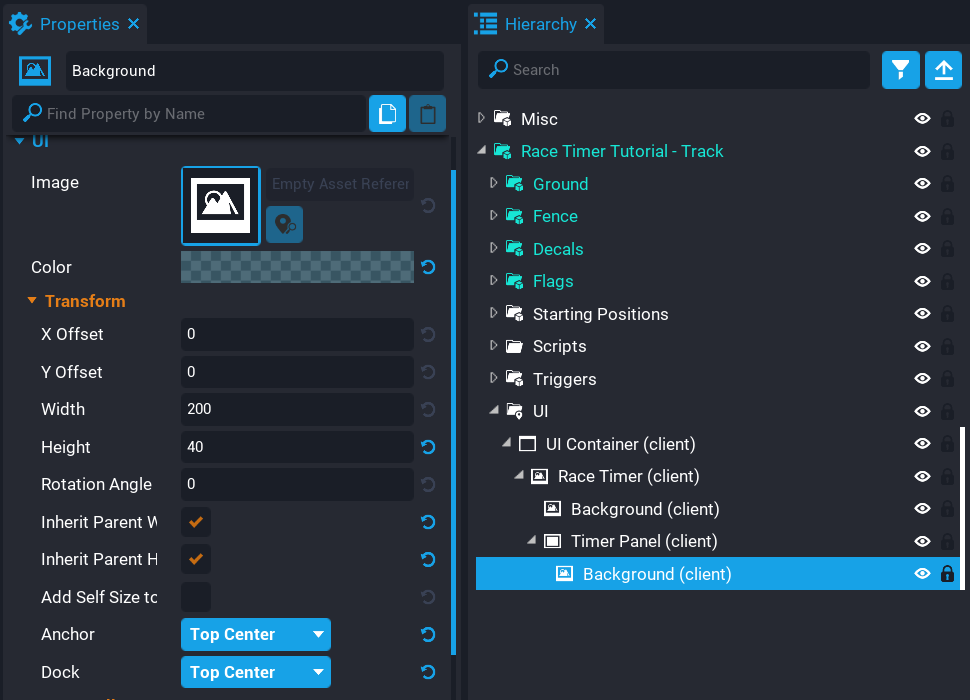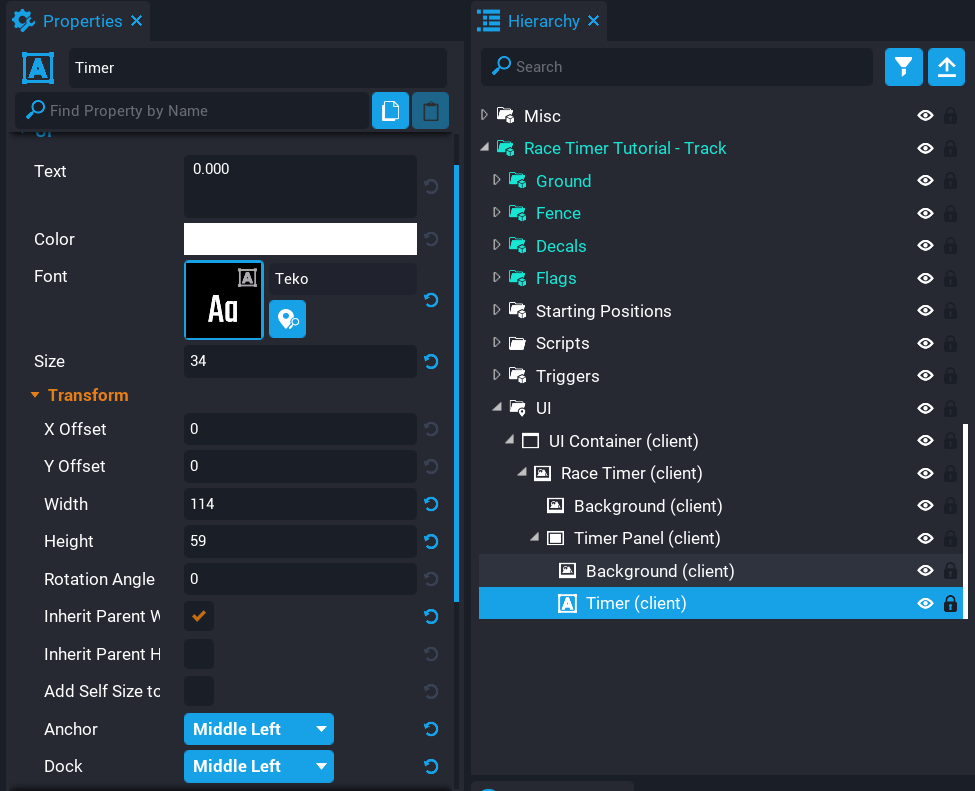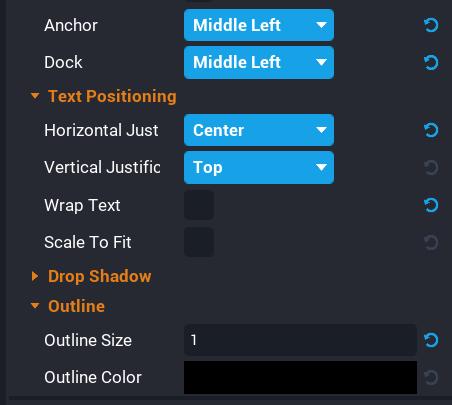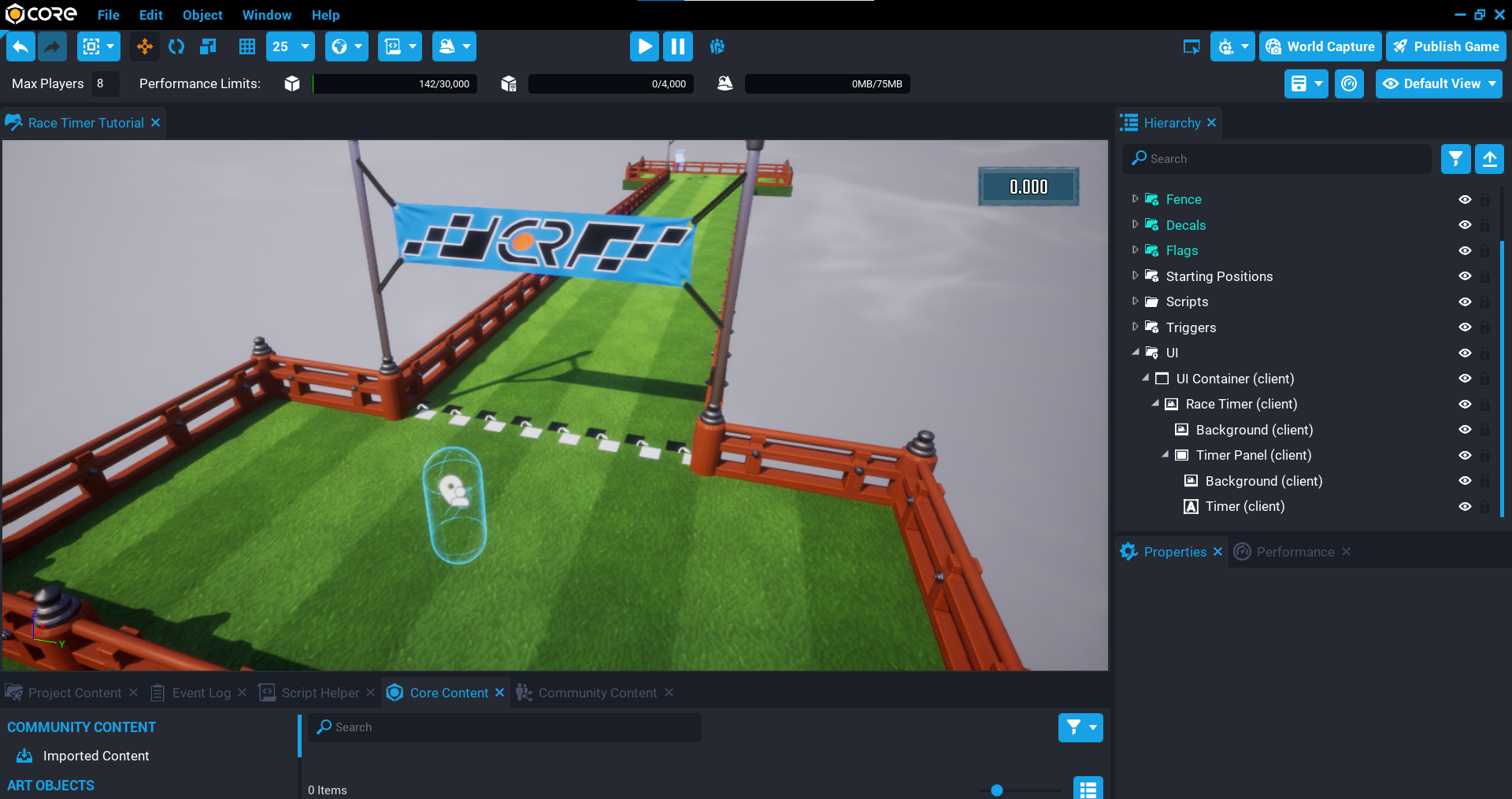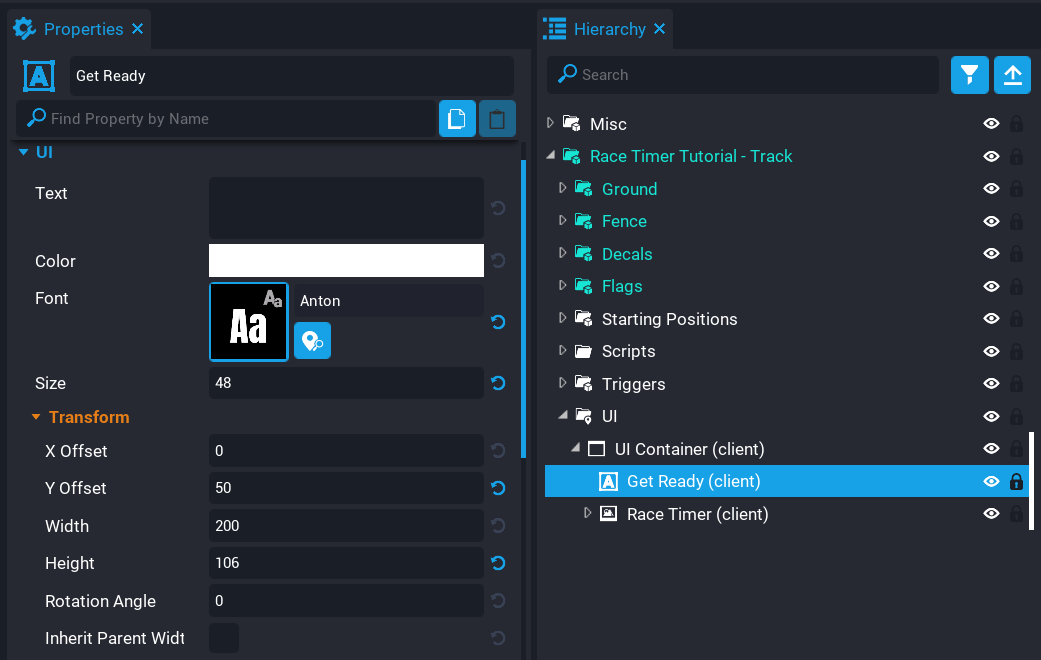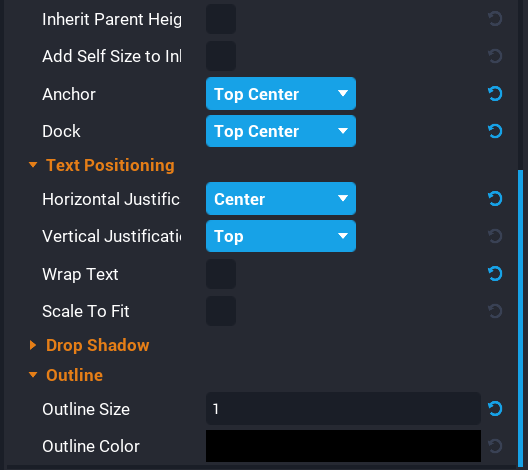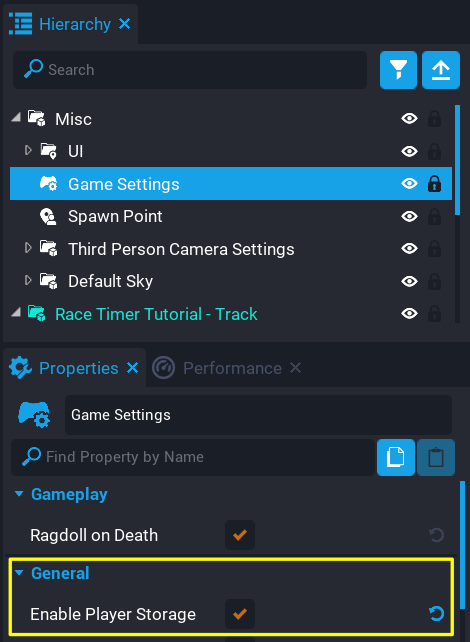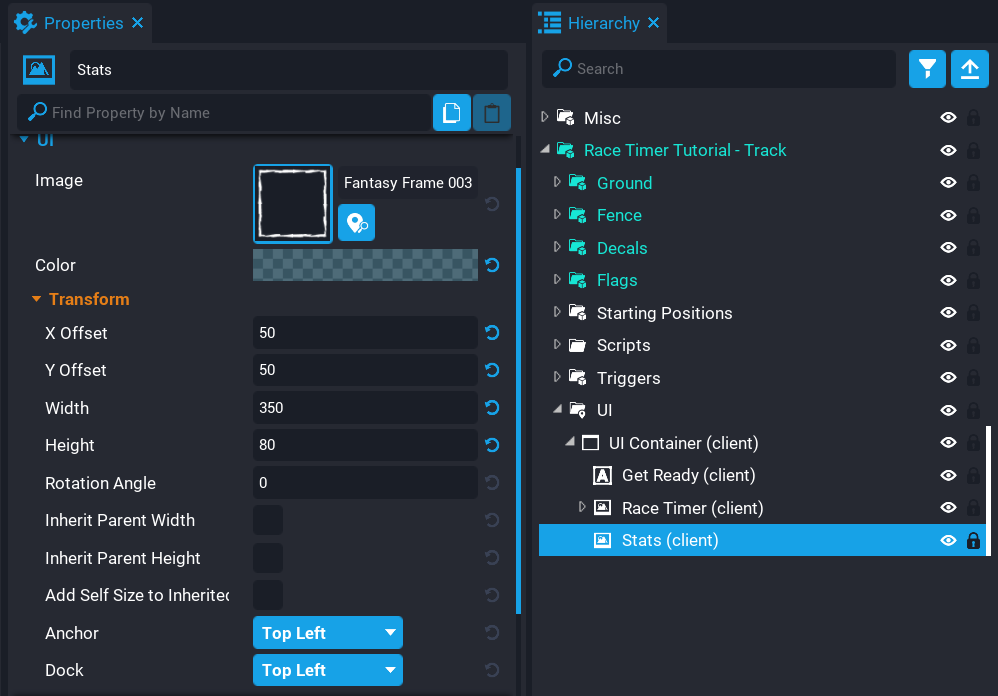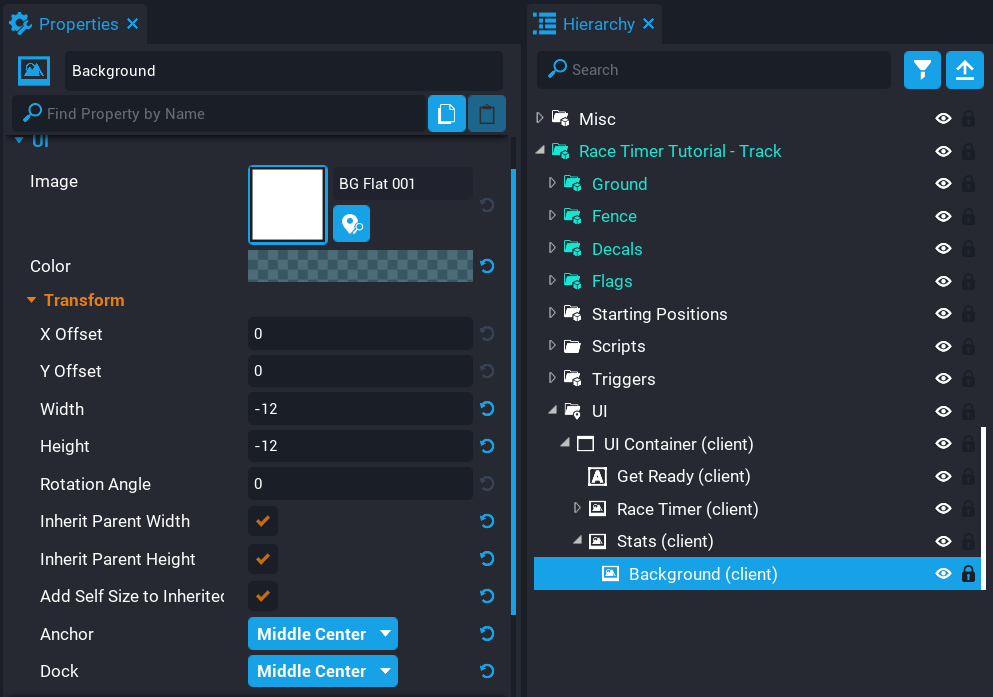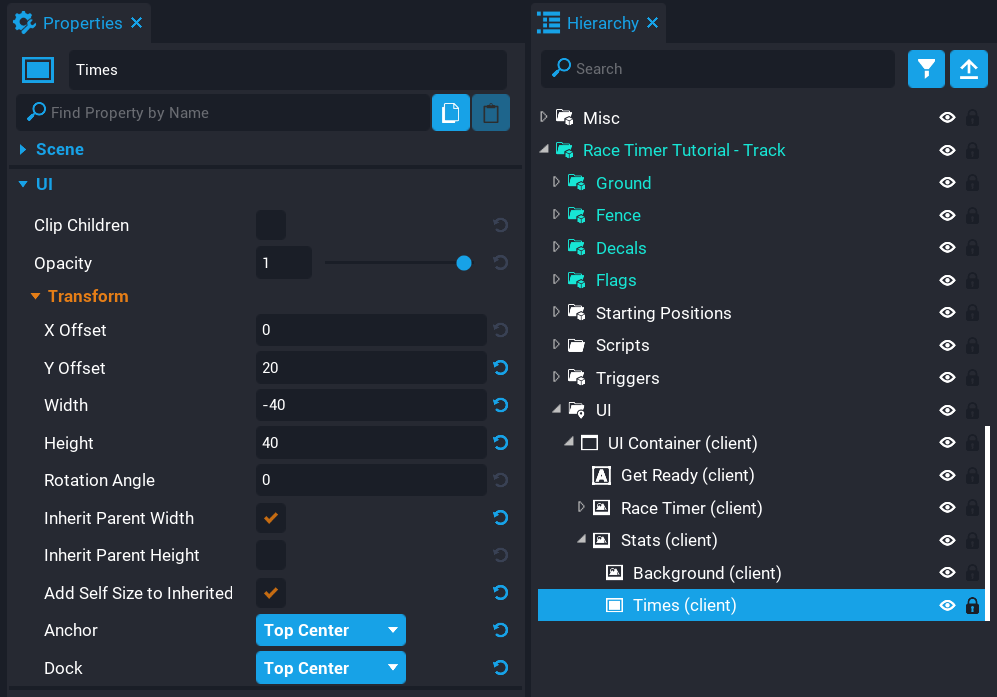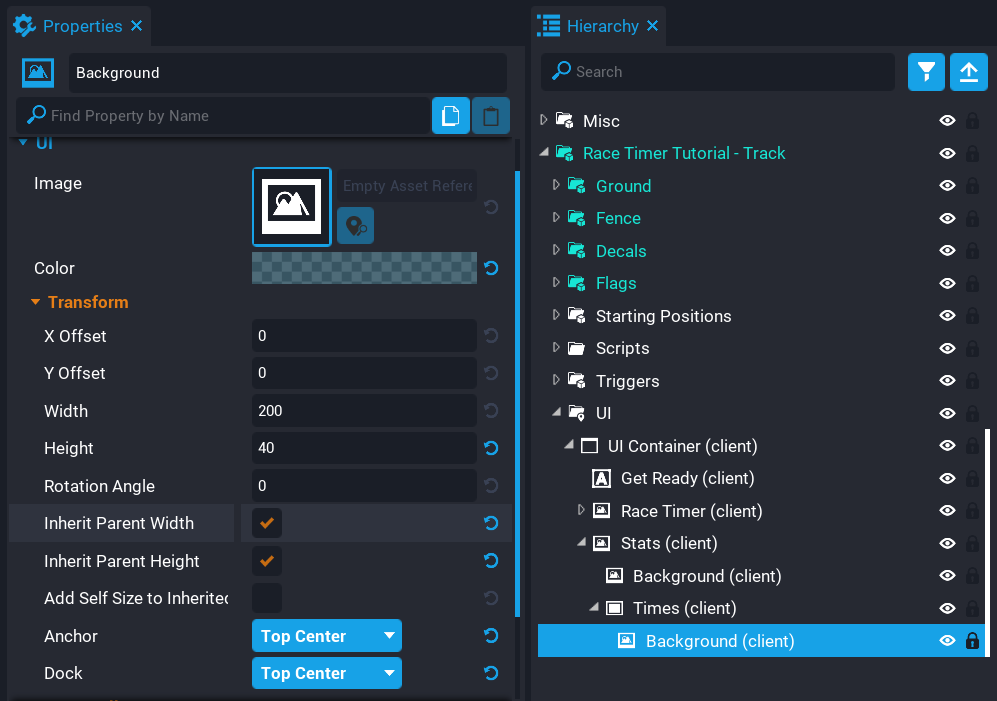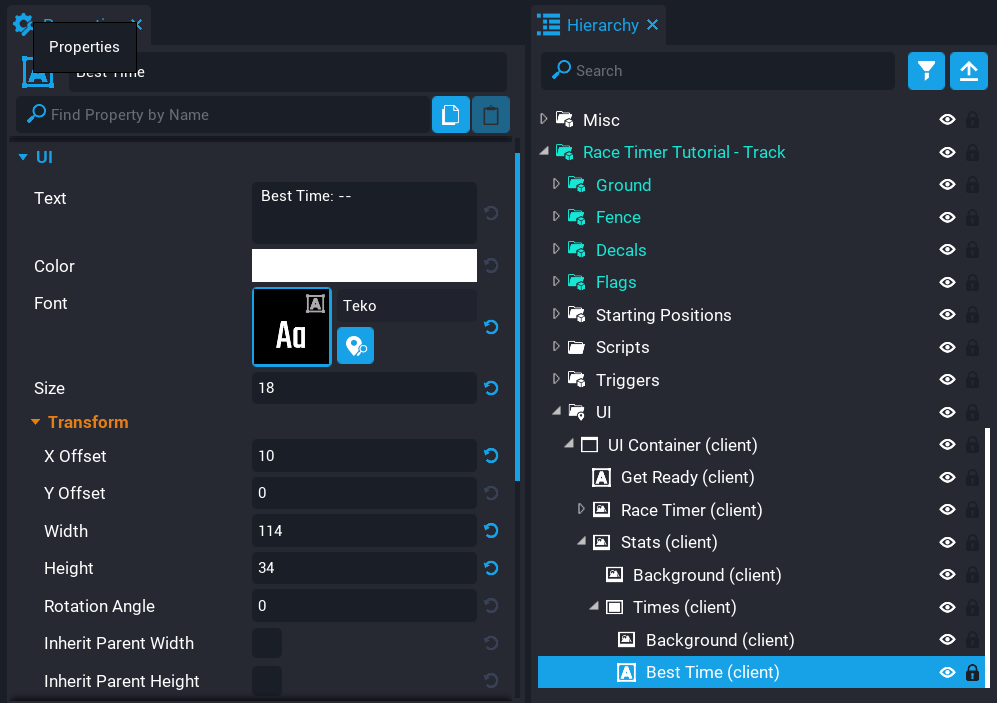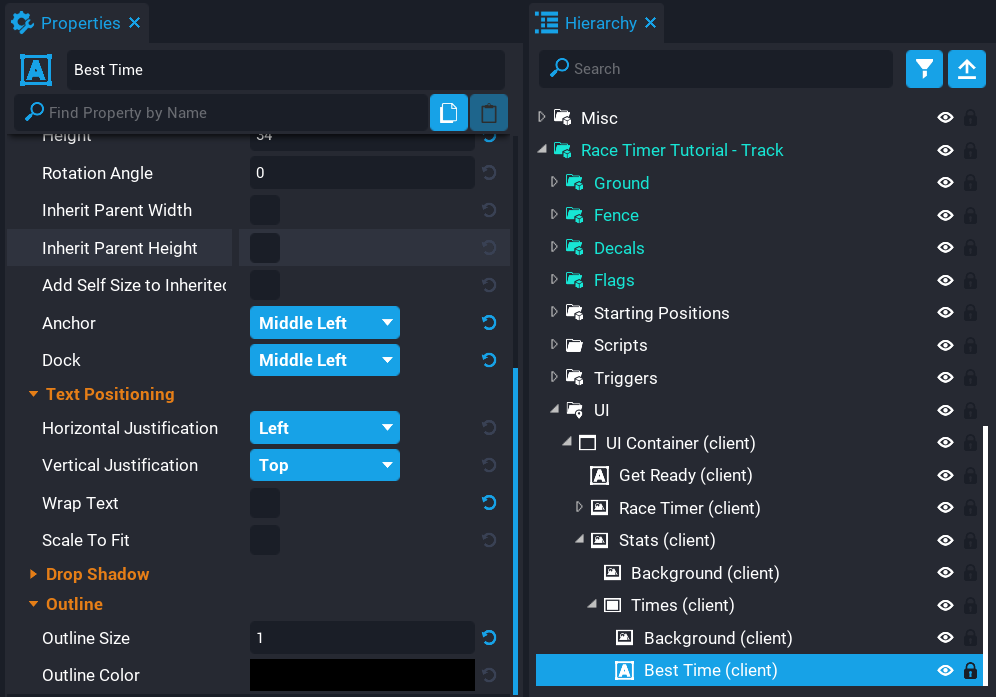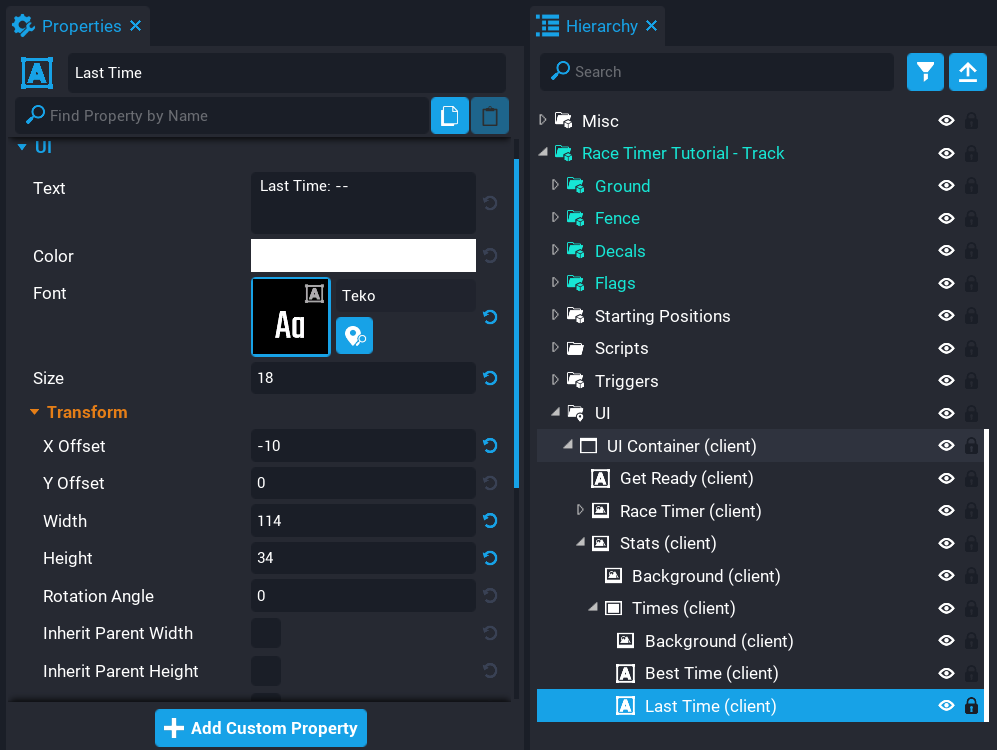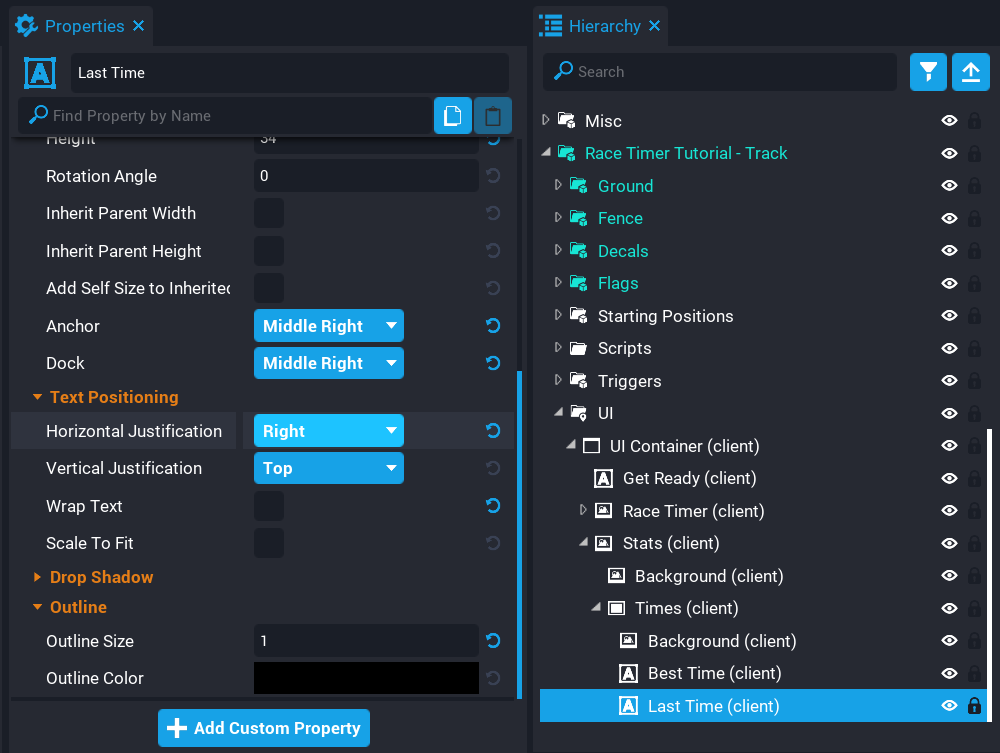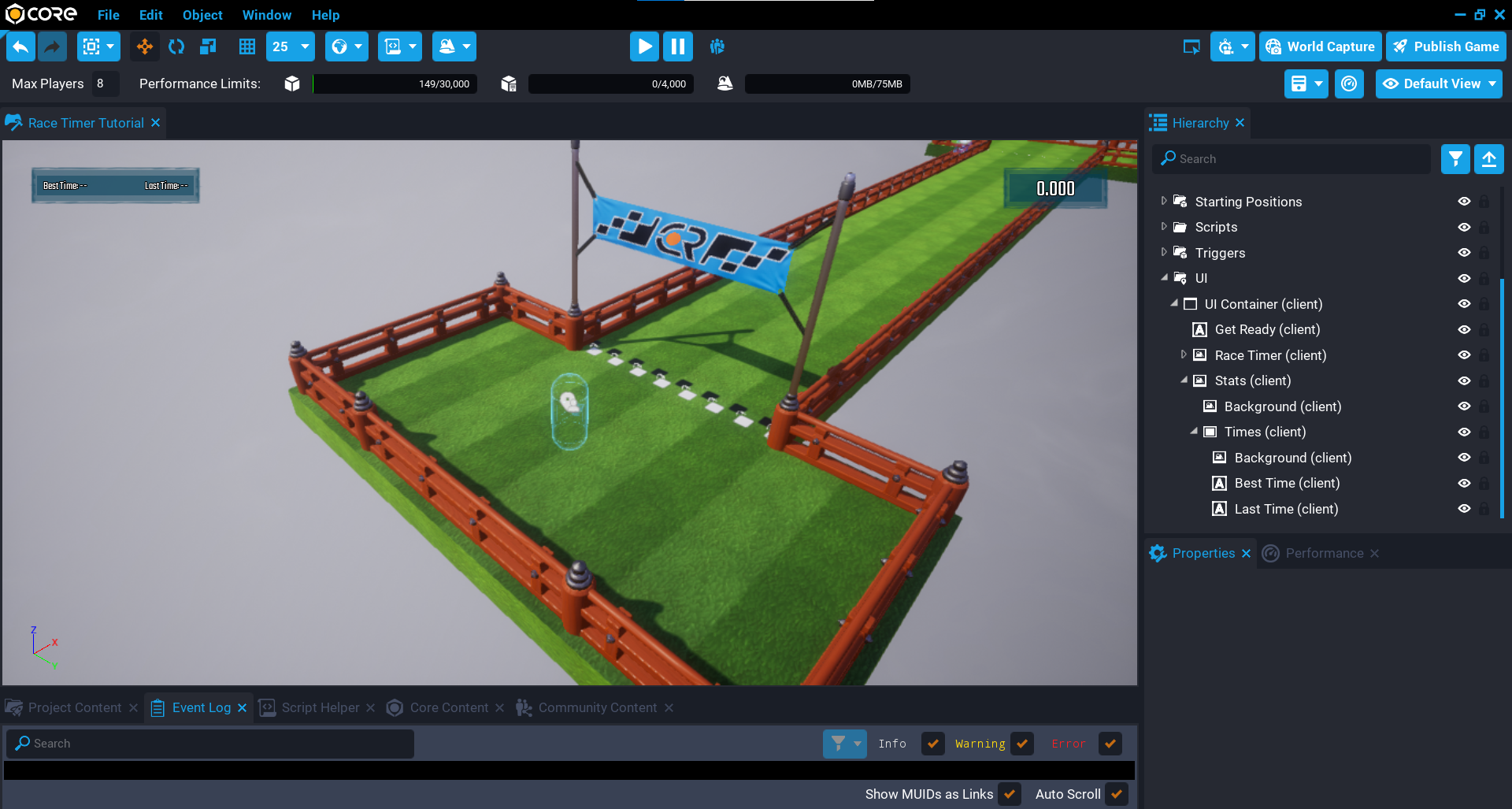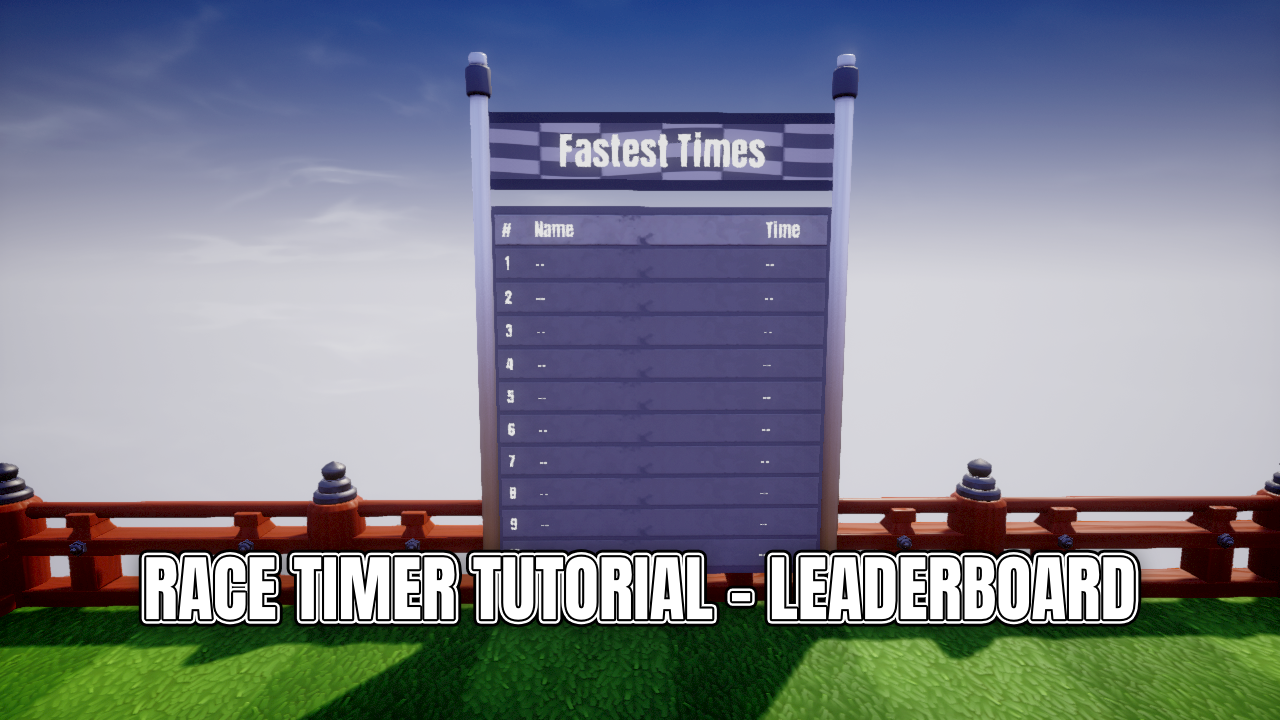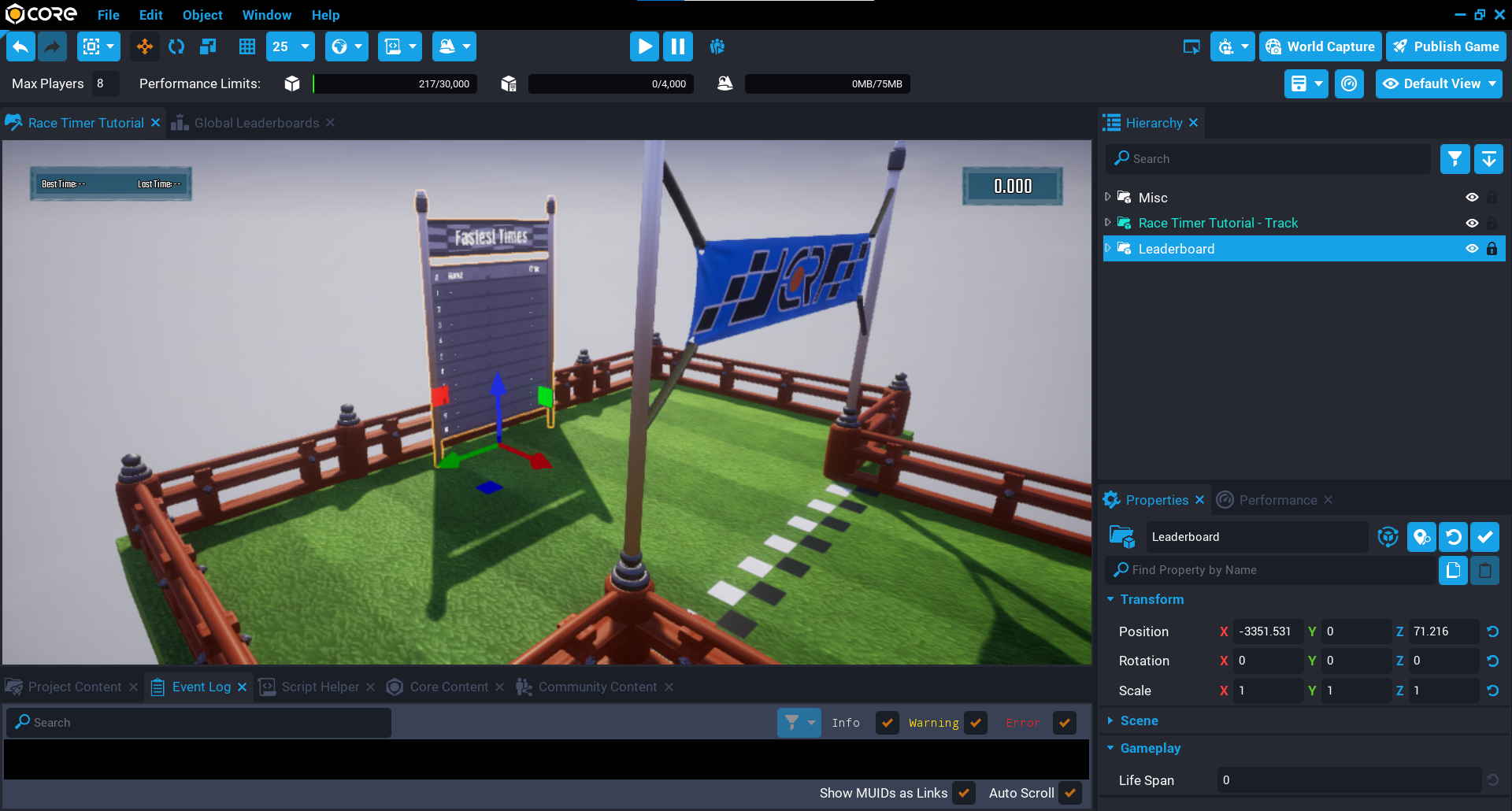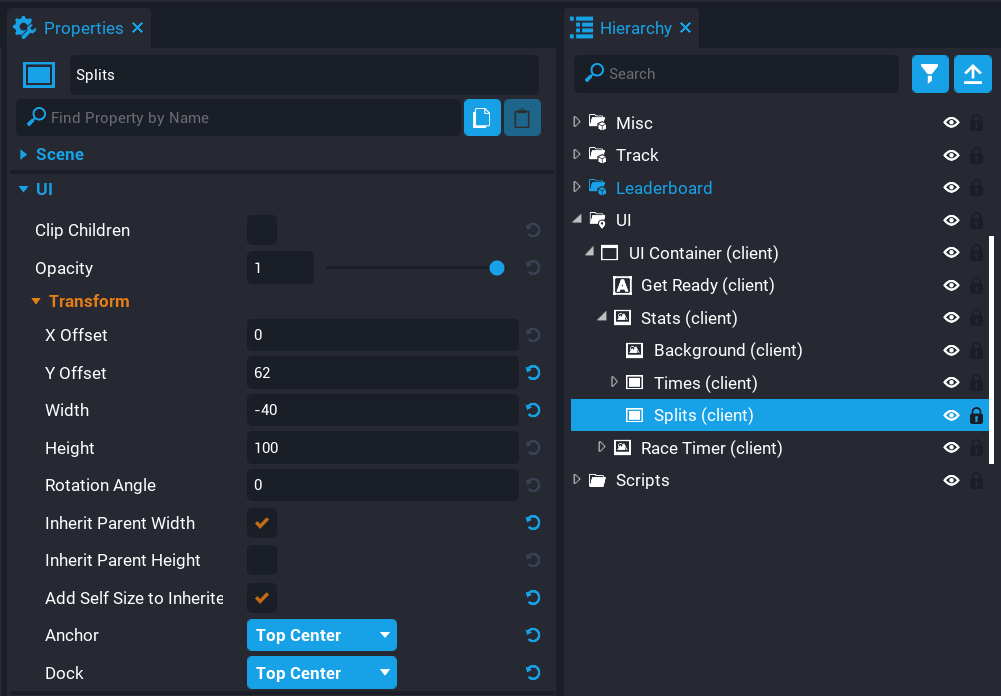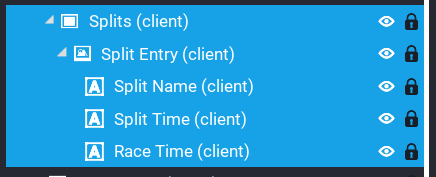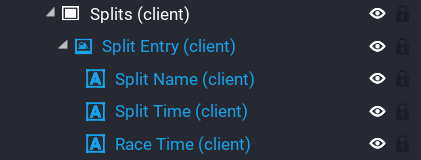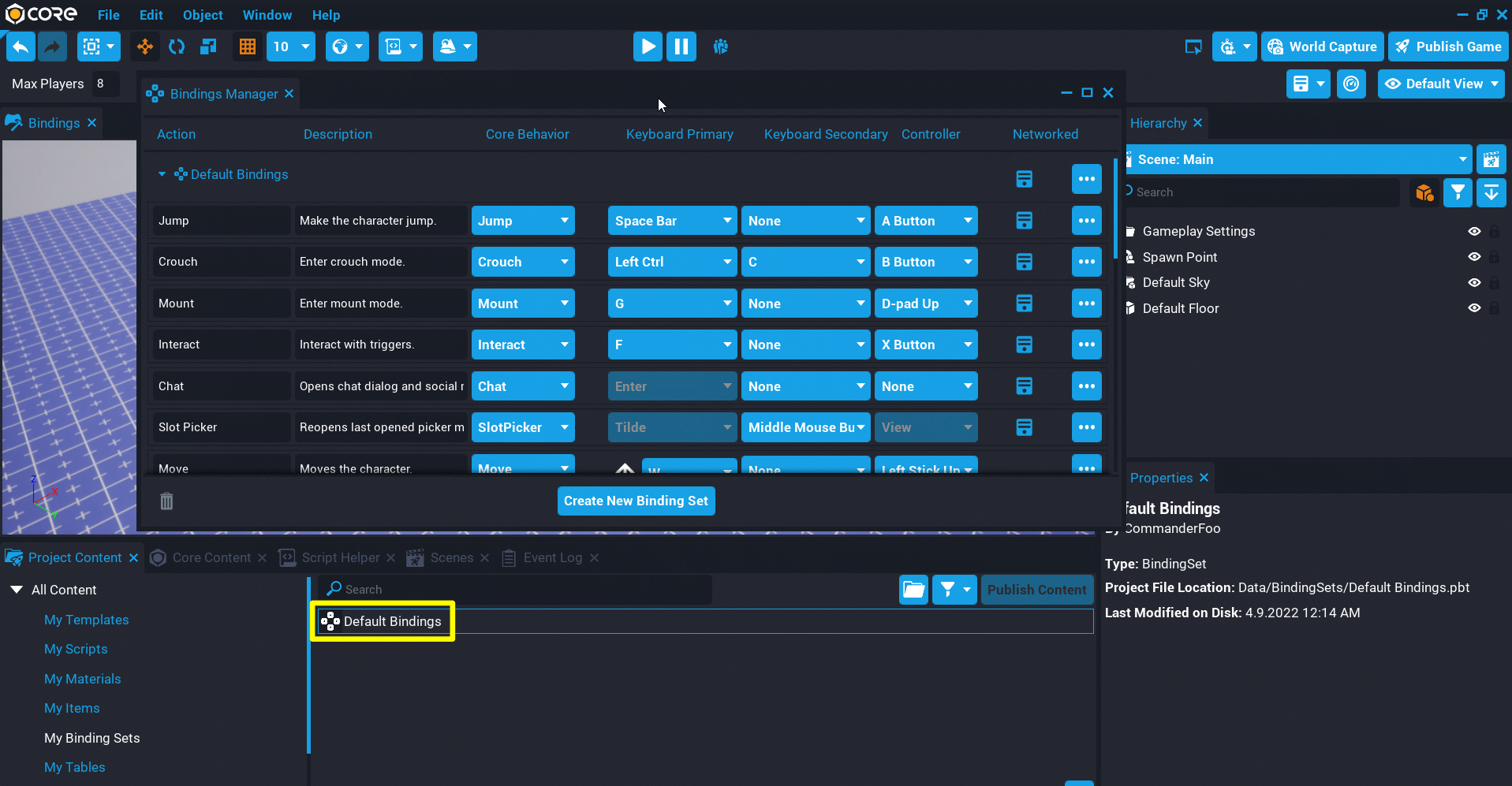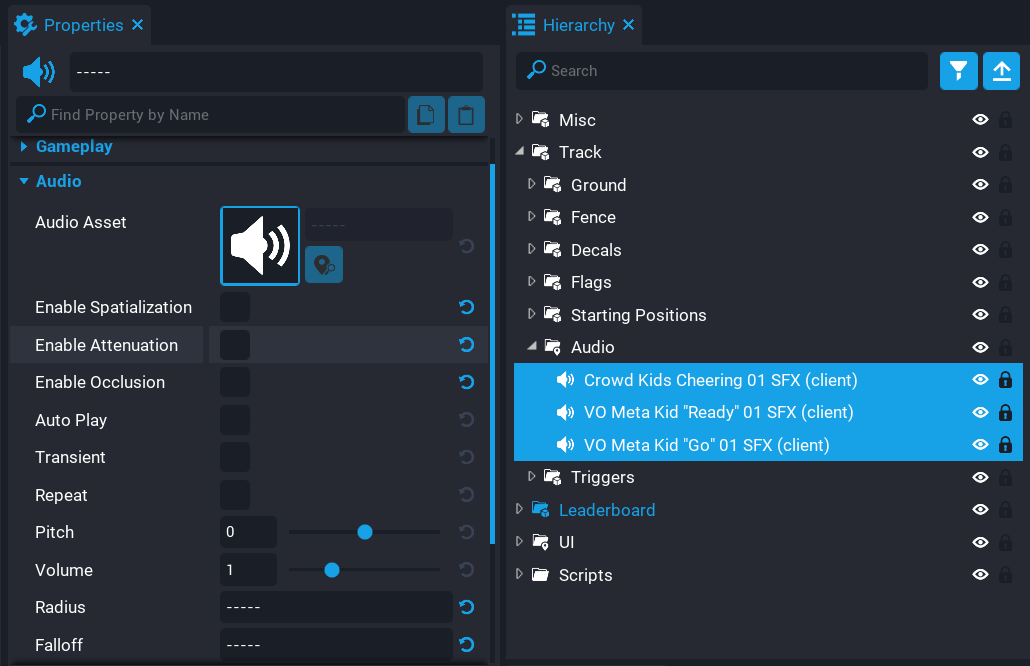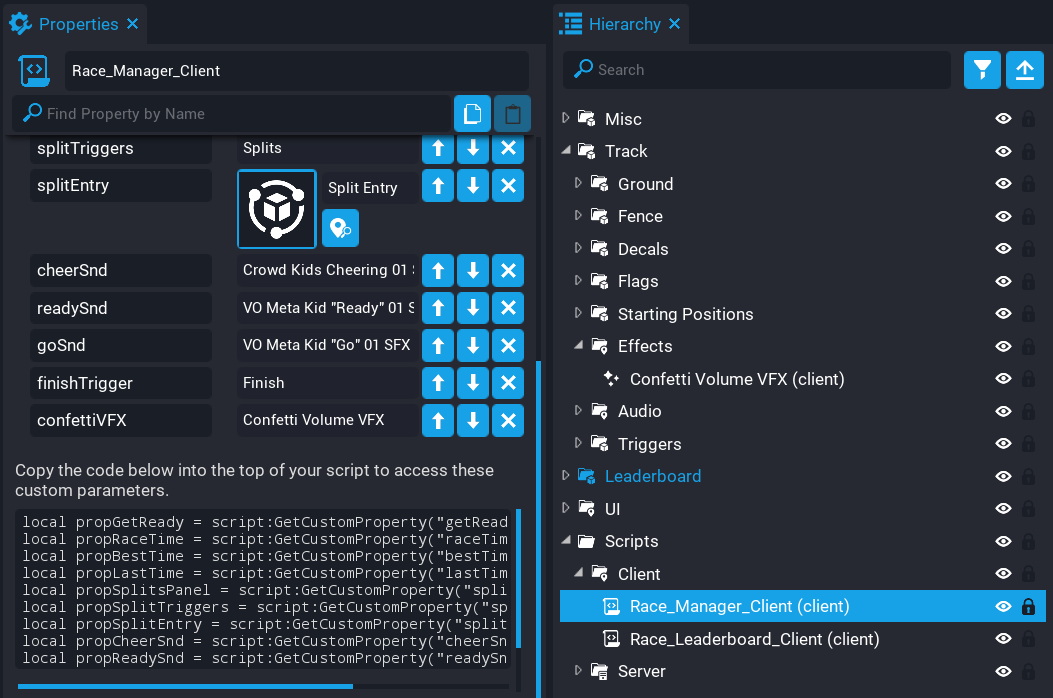Advanced Scripting in Core
Overview
In this tutorial, you are going to explore more of the Core API to make a race timer for a multiplayer game from start to finish.
- Completion Time: ~3 hours
- Knowledge Level: It's recommended to have completed the Scripting Beginner and Scripting Intermediate tutorials.
- Skills you will learn:
- When to use Client and Server contexts
- Accurate time keeping
- Communicating from server to client
- Persistent storage
- Sending and receiving private data
- Submitting and retrieving leaderboard data
Create Project and Track
Community Content Track
A track has been uploaded to Community Content to help you get started. This can be imported from the Community Content window by searching for Race Timer Tutorial - Track by CoreAcademy.
- Create a new empty project.
- In the Hierarchy delete the object Default Floor.
- Drag and drop the template Race Timer Tutorial - Track into the Hierarchy.
If you enter Play mode you will notice the spawn position isn't in an ideal location for any player that joins the game. Move the Spawn Point so that it's before the starting position on the track.
Create Starting Line
When a race is about to start, you need to move the players to the starting line.
Player Grouping
Instead of grouping all players up in one spot, you can create a few positions along the starting line and randomly pick one to place the player at. There is still a possibility of players spawning in the same location, and to fix this it would require a more advanced system to keep track of which lanes have been assigned.
Create Lane Positions
Visual Aid for Placing Spawn Points
As a visual aid to help move the starting positions, an object such as a Cube can be used. For performance, it's recommended to use a Group when needing to reference a position for spawning in objects. Group objects have minimal properties (that is no Rendering) compared to other objects.
- Create a new group called Starting Positions inside the Race Timer Tutorial - Track group.
- Drag and drop a Cube from Core Content into the Starting Positions group.
- Set Game Collision to Force Off for the Cube object.
- Set Camera Collision to Force Off for the Cube object.
- Rename Cube to
Position. - Duplicate and space these out along the starting line.
- Set Visibility to Force Off for all Position objects.
Client and Server Context
Set up Script Hierarchy
You need to set up the script folder and contexts in the Hierarchy.
- Create a folder called Scripts inside the Race Timer Tutorial - Track group.
- Create a Client Context inside the Scripts folder.
- Create a Server Context inside the Scripts folder.
Server Authoritative Design
A game server is a server that is the authoritative source of events in a game. The server sends data about the game state to allow players, which is used to maintain their accurate version of the game world.
Anything in the Client Context exists on each player's version of the game. This means that there is no network traffic, and anything that gets modified is applied to that local player and not all players on the server.
Nothing sensitive will be stored in a Client Context script, and any action the client can do will always be sent to a script in a Server Context to validate it. The client will never be treated as an authority on the state of the game for all players.
Take a look at the example below of what is bad vs good.
-- Client script
local itemPrice = 1500
local itemId = 3
-- Client can purchase an item from the game shop.
shop_button.clickedEvent:Connect(function()
Events.BroadcastToServer("purchase_item", itemPrice, itemId)
end)
This code above is bad because the broadcast to the server is also sending the price of the item which could be modified by the client.
-- Client script
local itemId = 3
-- Client can purchase an item from the game shop.
-- Notice that no price is sent to the server.
shop_button.clickedEvent:Connect(function()
Events.BroadcastToServer("purchase_item", itemId)
end)
The server script will then handle validating if the player can purchase the item and if so it will initiate the purchase and possibly broadcast back to the client if it was successful or not.
Default Context
There is another context called Default Context. Any script in this context is also viewable by the client. If you have code you want to protect from prying eyes, consider moving it to a Server Context.
For further information check out Networking in Core
Create Race Manager Server Script
The race manager server script is going to handle a few different things. You will be modifying this script a few times throughout the tutorial. In this section, the following items will be covered.
- Only start races when the server has players.
- Move players to the starting positions.
- Let the players know the race is about to begin and when to go.
- Keep track of the race time for each player.
- Stop the race when time has run out before starting a new race.
Create a new script called RaceManager_Server and place the script you created into the Server Context folder. Before opening the script, you need to set up the custom property for the positions so Lua has access to them.
Script Naming Convention
It's good habit to suffix scripts with the type of context they will be placed in so it's easier to find in the Project Content panel. For example, a server script could be called GameManager_Server, and the client script could be called GameManager_Client. Using this method of naming helps identify the context a script is for.
With the addition of Project Content folders organizing scripts, templates, and materials is recommended when creating bigger projects.
You want each player to be moved to a random lane position. At the same time, you need to mark each player in the race to keep track of who is and isn't currently racing because players can join the game while a race is in progress.
- Click on RaceManager_Server so it becomes the active object selected.
- Drag and drop the group Starting Positions onto the Add Custom Property button.
- Rename the custom property to
startingPositions.
Your Hierarchy and RaceManager_Server script will now look like the below image.
Open up the RaceManager_Server script by double clicking on it.
Script Editor
Core comes with a Script Editor built in that supports syntax highlighting, auto-complete, and script debugging. You can change which editor is used in the Settings under the Editor section. Another popular editor is Visual Studio Code which has an extension for the Core API. See Editor Extensions for more information.
local START_POSITIONS = script:GetCustomProperty("startingPositions"):WaitForObject()
local raceTask = nil
local players = {}
| Name | Description |
|---|---|
START_POSITIONS |
Using GetCustomProperty you can get a reference to custom properties you have set up on the script. |
raceTask |
This will be used later on as a simple way to handle the game state. More about this will be discussed when the raceTask handler is implemented. |
players |
You need to keep track of the players in the game. A good way to do that is putting players that have joined into a table for access later on. |
The word Handler is just a more specific term for function that is used with events. Handlers are also known as Callbacks.
Enable / Disable Player Movement
local function EnablePlayerMovement(player)
player.movementControlMode = MovementControlMode.LOOK_RELATIVE
end
local function DisablePlayerMovement(player)
player.movementControlMode = MovementControlMode.NONE
end
The code above contains two helper functions that will allow us to disable and enable player movement. You need to prevent players who are at the starting positions from moving.
Any function that doesn't need to be accessed outside of the script should be marked as local. This doesn't include functions that are overridden like Tick.
Move Player to Starting Line
local function MovePlayersToStart()
for index, currentPlayer in ipairs(Game.GetPlayers()) do
DisablePlayerMovement(currentPlayer)
local startPosition = START_POSITIONS:GetChildren()[math.random(#START_POSITIONS:GetChildren())]
currentPlayer:SetWorldPosition(startPosition:GetWorldPosition())
currentPlayer:SetWorldRotation(startPosition:GetWorldRotation())
players[currentPlayer.id].inRace = true
end
end
MovePlayersToStart will get called later by the race task. This function handles disabling the player movement, setting position, and rotation by looping over all players that are currently in the game.
ipairs()
The ipairs() function will iterate over index value pairs. These are key-value pairs where the keys are indices in an array. The order that elements are returned is guaranteed to be in the order of the indices, and keys that are not an integer will be skipped over.
local startPosition = START_POSITIONS:GetChildren()[math.random(#START_POSITIONS:GetChildren())]
p:SetWorldPosition(startPosition:GetWorldPosition())
p:SetWorldRotation(startPosition:GetWorldRotation())
To place players randomly along the start line, you can select a random child from START_POSITIONS. The rotation of the child is also used for the player to make sure the player character is facing down the track.
players[currentPlayer.id].inRace = true
You need to keep track of when players are in a race. You can do this by setting the property inRace to true.
Allow Players to Race
local function EnablePlayers()
for index, currentPlayer in ipairs(Game.GetPlayers()) do
if players[currentPlayer.id].inRace then
EnablePlayerMovement(currentPlayer)
players[currentPlayer.id].startTime = time()
end
end
end
The EnablePlayers function is called later on by the race task. This function loops over all players that have inRace set to true. If the property is true, then the player has their movement enabled.
players[currentPlayer.id].startTime = time()
This line sets the time that the race started. You need to keep accurate track of the time, so this is recorded on the server which will be used later to work out how long it took the player to finish the race.
time() returns the time in seconds (floating point) since the game started on the server.
Connect Player Joined and Left Events
local function OnPlayerJoined(player)
player.maxJumpCount = 0
player.canMount = false
players[player.id] = {
inRace = false,
startTime = 0,
finishTime = 0
}
end
The function OnPlayerJoined is called each time a player joins the server. To begin, you need to disable player mounts and player jumping. You want this to be a sprint race, so setting maxJumpCount to 0 prevents the player from jumping.
You can also use the handler OnPlayerJoined to push each new player to the players table to keep track of players in the game. The value stored in the table is a table with some defaults setup that will be used throughout the script.
| Name | Description |
|---|---|
inRace |
This property gets updated with either true or false. If a player joins late while a race is already in progress, then you can use this property to determine which players are actively racing. |
startTime |
This property gets updated when the race starts and when the race finishes. It keeps track of the starting time of the race which is used later to work out how long it took the player to cross the finish line. |
finishTime |
Later on you will add a trigger to the finish line so that when a player overlaps the trigger, it will record the time at that point. This is used along with startTime to determine how long it took the player to get from start to finish. |
local function OnPlayerLeft(player)
if players[player.id] ~= nil then
players[player.id] = nil
end
end
When a player leaves the game, you need to clean up the players`` table by removing the player from theplayerstable. Setting the value tonil` is a good way to tell Lua that you no longer need it.
Game.playerJoinedEvent:Connect(OnPlayerJoined)
Game.playerLeftEvent:Connect(OnPlayerLeft)
The code needs to connect the OnPlayerJoined and OnPlayerLeft events to the playerJoinedEvent event and playerLeftEvent event.
Send Race Notification
You want to let the players know when to get ready and when to go. Place both functions just after the OnPlayerLeft function.
local function TellPlayersToGetReady()
for index, currentPlayer in ipairs(Game.GetPlayers()) do
if players[currentPlayer.id].inRace then
Events.BroadcastToPlayer(currentPlayer, "GetReady")
end
end
end
The function TellPlayersToGetReady will broadcast to each player that is marked as in the race who is in the game currently. This is done so players who join late don't receive the notification. Later on, in the tutorial, you will listen to this broadcast event and set up a handler.
local function TellPlayersToGo()
for index, currentPlayer in ipairs(Game.GetPlayers()) do
if players[currentPlayer.id].inRace then
Events.BroadcastToPlayer(currentPlayer, "Go")
end
end
end
The function TellPlayersToGo will broadcast to each player that is marked as in the race. Later on, in the tutorial, you will listen to this broadcast event and set up a handler.
Stop the Race
You need to handle stopping a race when the race timer has finished, so place the function below just after the TellPlayersToGo function.
local function StopRace()
for id, p in pairs(players) do
p.inRace = false
end
Events.BroadcastToAllPlayers("StopRace")
end
The function StopRace will loop through all the players on the server and set the property inRace to false indicating they are no longer in the race. You then broadcast to all players that the race will be stopped. Later on in the tutorial, you will listen to this broadcast event and create a handler.
Repeating Task
local function task_handler()
if raceTask == nil then
raceTask = Task.Spawn(task_handler, 14)
raceTask.repeatInterval = 10
raceTask.repeatCount = -1
end
if #Game.GetPlayers() == 0 then
return
end
StopRace()
Task.Wait(2)
MovePlayersToStart()
TellPlayersToGetReady()
Task.Wait(2)
TellPlayersToGo()
EnablePlayers()
end
Task.Spawn(task_handler)
You need a way to manage the state of the game, and a simple way to handle that for this example is using a task.
Create Repeating Task
You need to create a repeating task if one hasn't been set up. This task will repeat every 10 seconds and handle the state of the game. Because the length of the track doesn't take very long to finish for the player, you limit the duration of each race to 10 seconds.
You can delay the initial spawning of the task by 14 seconds to take into account the 4 seconds when Task.Wait is used. If you don't do this, then the first race on the server will be short.
Using a repeating task has the added benefit of resetting the race if any players are inactive.
raceTask.repeatCount = -1
You can set repeatCount to -1 to force the task to repeat forever.
Check if Players are in the Game
The task handler will check to see if there are any players in the game. If the number of players is 0, then you exit the handler early by using return.
Stop Current Race
Because the race has a time limit based on the repeating task, you need to make sure the race is reset each time the task handler is called.
Move Players to Starting Positions
After a 2 second wait by using Task.Wait, you then move all players to the starting positions by calling MovePlayersToStart. This function also handles disabling the player movement.
Notify Players to Get Ready
Calling TellPlayersToGetReady will broadcast to any player who is in the race letting them know to get ready.
Enable Player Movement
You can wait another 2 seconds by using Task.Wait and notify the players to go so they know when to start running. At the same time, you enable all players by calling EnablePlayers.
Enter Play Mode and Test
Enter Play mode and test that everything is working. If you have followed the tutorial so far, then this is what happens:
- The Player spawns in at the Spawn Point.
- After a few seconds, the player's movement is disabled and moved to a random starting position.
- After another few seconds, the player can now move.
- Every 10 seconds the task will reset the player back to a random starting position.
The Full RaceManager_Server Script
RaceManager_Server
local START_POSITIONS = script:GetCustomProperty("startingPositions"):WaitForObject()
local FINISH_TRIGGER = script:GetCustomProperty("finishTrigger"):WaitForObject()
local raceTask = nil
local players = {}
local function EnablePlayerMovement(player)
player.movementControlMode = MovementControlMode.LOOK_RELATIVE
end
local function DisablePlayerMovement(player)
player.movementControlMode = MovementControlMode.NONE
end
--[[
Moves all players in the game to the starting position. A position at random
is picked for the player. There is a chance that more than one player can be
at the same position.
]]
local function MovePlayersToStart()
for index, currentPlayer in ipairs(Game.GetPlayers()) do
-- Need to disable player movement at the start to prevent players
-- from moving forward before the race has started.
DisablePlayerMovement(currentPlayer)
-- Fetch a random starting position for this player and set their world position
-- and rotation. The rotation is based on the rotation of the "position" object.
local startPosition = START_POSITIONS:GetChildren()[math.random(#START_POSITIONS:GetChildren())]
currentPlayer:SetWorldPosition(startPosition:GetWorldPosition())
currentPlayer:SetWorldRotation(startPosition:GetWorldRotation())
-- Mark this player as in the race which is used later on to make sure the player
-- is a valid racer when crossing the finish line.
players[currentPlayer.id].inRace = true
end
end
--[[
At the start of the race loop over all players and check if they are marked as being in
the race by checking if "inRace" is true. If it is, then enable the player movement and
record the time the race started.
]]
local function EnablePlayers()
for index, currentPlayer in ipairs(Game.GetPlayers()) do
if players[currentPlayer.id].inRace then
EnablePlayerMovement(currentPlayer)
players[currentPlayer.id].startTime = time()
end
end
end
local function OnPlayerJoined(player)
-- Since this is a race, disable jump and mount.
player.maxJumpCount = 0
player.canMount = false
-- Add this player to the "players" list and setup default properties
-- that will be accessed, and updated later for each player.
-- The "players" table is a key value table where the key is the players ID.
players[player.id] = {
inRace = false,
startTime = 0,
finishTime = 0
}
end
--[[
When the player leaves the game, some cleanup is needed. It's good practice
to clean up anything that is no longer needed. In this a check is done to
see if the player who is leaving has an entry in the "players" table. If there
is an entry it is set to "nil" to remove it.
]]
local function OnPlayerLeft(player)
if players[player.id] ~= nil then
players[player.id] = nil
end
end
--[[
Tell players to get ready as the race is about to begin.
Only players who are in the race will receive the broadcast.
]]
local function TellPlayersToGetReady()
for index, currentPlayer in ipairs(Game.GetPlayers()) do
if players[currentPlayer.id].inRace then
Events.BroadcastToPlayer(currentPlayer, "GetReady")
end
end
end
local function TellPlayersToGo()
for index, currentPlayer in ipairs(Game.GetPlayers()) do
if players[currentPlayer.id].inRace then
Events.BroadcastToPlayer(currentPlayer, "Go")
end
end
end
--[[
Handles stopping the race when the race task restarts.
All players get "inRace" set to false ready for the next race.
]]
local function StopRace()
-- Notice that "pairs" is used instead of "ipairs" for the loop. This is because
-- the "players" table is not an indexed table. It's made up of key value pairs
-- where the key is not an index. In this case the key is the players ID that is
-- used as a lookup.
for id, p in pairs(players) do
p.inRace = false
end
Events.BroadcastToAllPlayers("StopRace")
end
-- Game Events
Game.playerJoinedEvent:Connect(OnPlayerJoined)
Game.playerLeftEvent:Connect(OnPlayerLeft)
-- Repeating task that checks if there are players in the game.
-- The function will return (exit) if there are 0 players to prevent
-- statements from executing further down in the body of the function.
local function task_handler()
if raceTask == nil then
raceTask = Task.Spawn(task_handler, 14)
-- Change "repeatInterval" if the race will last longer.
-- This task handles the game state in a very simplified way.
raceTask.repeatInterval = 10
raceTask.repeatCount = -1
end
if #Game.GetPlayers() == 0 then
return
end
StopRace()
Task.Wait(2)
MovePlayersToStart()
TellPlayersToGetReady()
Task.Wait(2)
TellPlayersToGo()
EnablePlayers()
end
Task.Spawn(task_handler)
Create Finish Line Trigger
You need to add a trigger to the finish line so that when the player overlaps the trigger, the time is recorded.
Create a Trigger
Create a new group inside of your track group, and call it Triggers. This group will contain the finish line trigger and a few other triggers later on in the tutorial.
Add a new Trigger inside the Triggers group and name it Finish.
Add finishTrigger Custom Property
The RaceManager_Server script needs to have a way to reference the finish line trigger. Click on the RaceManager_Server script so it becomes the active object in the Hierarchy and drag the Finish trigger onto the Add Custom Property button. Rename the new custom property to finishTrigger.
Position Trigger
The Finish trigger now needs to be placed at the finish line, making sure that it covers across the track for the player to overlap with.
Create Trigger Overlap Handler
Modify the RaceManager_Server script so that the finish line trigger can be used to detect when a player has overlapped it.
Add Custom Property
Add the following line to the top of the script under the STARTING POSITIONS variable.
local FINISH_TRIGGER = script:GetCustomProperty("finishTrigger"):WaitForObject()
Add Trigger Handler
After the OnPlayerLeft function, you are going to add the handler that will get fired when a player overlaps the finish line trigger.
local function OnFinishTriggerOverlap(trigger, obj)
if Object.IsValid(obj) and obj:IsA("Player") and players[obj.id] ~= nil and players[obj.id].inRace then
players[obj.id].finishTime = time()
players[obj.id].inRace = false
local finalTime = players[obj.id].finishTime - players[obj.id].startTime
print(finalTime) -- Print out the time to test
Events.BroadcastToPlayer(obj, "RaceFinished", finalTime)
end
end
The trigger handler above will make sure that the obj is a valid Player object type. You then check to see if the player is in the players table and if inRace is marked as true. You do this so that players who join the server while a race is in progress don't get detected when they overlap the trigger.
players[obj.id].finishTime = time()
You then set finishTime to the current time since the game started. This means that you now have a start and end time which you can use later to determine the best time for the player.
players[obj.id].inRace = false
This point, the player is now marked as not in the race. This prevents the overlap handler from triggering again.
local finalTime = players[obj.id].finishTime - players[obj.id].startTime
The player will receive an accurate final time of their race. You do this by subtracting the start time of the race away from the finish time. This will give us the time it took for the player to run the race.
print(finalTime)
To test that the time is being recorded correctly, you can print out finalTime to the Event Log.
Broadcast to Player
Events.BroadcastToPlayer(obj, "RaceFinished", finalTime)
You broadcast to the player that the race has finished, and also send their final time. Later on, you will connect to this event from the client to update the time displayed in the UI with the time sent from the server.
Client vs Server Trust
The client can#t be trusted to send their race time, so this is all tracked on the server and sent to the client when the player has finished the race. If the race time was tracked client side and then submitted to the server, this could be exploited by the client by modifying the data that is sent from client to server. Nearly anything the client does needs to ask for data (that is final race time), or get permission from the server.
Connect Trigger Event
FINISH_TRIGGER.beginOverlapEvent:Connect(OnFinishTriggerOverlap)
You can now connect the beginOverlapEvent event up. Place this just before the lines of code that connect up the game events for when players join and leave.
Test the Game
Enter Play mode and test that everything is working. Crossing the finish line will print out the race time in the Event Log.
The Updated RaceManager_Server Script
RaceManager_Server
local START_POSITIONS = script:GetCustomProperty("startingPositions"):WaitForObject()
local FINISH_TRIGGER = script:GetCustomProperty("finishTrigger"):WaitForObject()
local raceTask = nil
local players = {}
local function EnablePlayerMovement(player)
player.movementControlMode = MovementControlMode.LOOK_RELATIVE
end
local function DisablePlayerMovement(player)
player.movementControlMode = MovementControlMode.NONE
end
--[[
Moves all players in the game to the starting position. A position at random
is picked for the player. There is a chance that more than one player can be
at the same position.
]]
local function MovePlayersToStart()
for index, currentPlayer in ipairs(Game.GetPlayers()) do
-- Need to disable player movement at the start to prevent players
-- from moving forward before the race has started.
DisablePlayerMovement(currentPlayer)
-- Fetch a random starting position for this player and set their world position
-- and rotation. The rotation is based on the rotation of the "position" object.
local startPosition = START_POSITIONS:GetChildren()[math.random(#START_POSITIONS:GetChildren())]
currentPlayer:SetWorldPosition(startPosition:GetWorldPosition())
currentPlayer:SetWorldRotation(startPosition:GetWorldRotation())
-- Mark this player as in the race which is used later on to make sure the player
-- is a valid racer when crossing the finish line.
players[currentPlayer.id].inRace = true
end
end
--[[
At the start of the race loop over all players and check if they are marked as being in
the race by checking if "inRace" is true. If it is, then enable the player movement and
record the time the race started.
]]
local function EnablePlayers()
for index, currentPlayer in ipairs(Game.GetPlayers()) do
if players[currentPlayer.id].inRace then
EnablePlayerMovement(currentPlayer)
players[currentPlayer.id].startTime = time()
end
end
end
local function OnPlayerJoined(player)
-- Since this is a race, disable jump and mount.
player.maxJumpCount = 0
player.canMount = false
-- Add this player to the "players" list and setup default properties
-- that will be accessed, and updated later for each player.
-- The "players" table is a key value table where the key is the players ID.
players[player.id] = {
inRace = false,
startTime = 0,
finishTime = 0
}
end
--[[
When the player leaves the game, some cleanup is needed. It's good practice
to clean up anything that is no longer needed. In this a check is done to
see if the player who is leaving has an entry in the "players" table. If there
is an entry it is set to "nil" to remove it.
]]
local function OnPlayerLeft(player)
if players[player.id] ~= nil then
players[player.id] = nil
end
end
--[[
When the player overlaps the finish line, this means they have finished the race, so
the final time gets sent to the player and submitted to the leaderboard. The reason
for sending it to the player is because server "time()" will be far more accurate then
"time()" on the client.
]]
local function OnFinishTriggerOverlap(trigger, obj)
if Object.IsValid(obj) and obj:IsA("Player") and players[obj.id] ~= nil and players[obj.id].inRace then
players[obj.id].finishTime = time()
players[obj.id].inRace = false
local finalTime = players[obj.id].finishTime - players[obj.id].startTime
print(finalTime) -- Print out the time to test
Events.BroadcastToPlayer(obj, "RaceFinished", finalTime)
end
end
--[[
Tell players to get ready as the race is about to being.
Only players who are in the race will receive the broadcast.
]]
local function TellPlayersToGetReady()
for index, currentPlayer in ipairs(Game.GetPlayers()) do
if players[currentPlayer.id].inRace then
Events.BroadcastToPlayer(currentPlayer, "GetReady")
end
end
end
local function TellPlayersToGo()
for index, currentPlayer in ipairs(Game.GetPlayers()) do
if players[currentPlayer.id].inRace then
Events.BroadcastToPlayer(currentPlayer, "Go")
end
end
end
--[[
Handles stopping the race when the race task restarts.
All players get "inRace" set to false ready for the next race.
]]
local function StopRace()
-- Notice that "pairs" is used instead of "ipairs" for the loop. This is because
-- the "players" table is not an indexed table. It's made up of key value pairs
-- where the key is not an index. In this case the key is the players ID that is
-- used as a lookup.
for id, p in pairs(players) do
p.inRace = false
end
Events.BroadcastToAllPlayers("StopRace")
end
-- Trigger Event
FINISH_TRIGGER.beginOverlapEvent:Connect(OnFinishTriggerOverlap)
-- Game Events
Game.playerJoinedEvent:Connect(OnPlayerJoined)
Game.playerLeftEvent:Connect(OnPlayerLeft)
-- Repeating task that checks if there are players in the game.
-- The function will return (exit) if there are 0 players to prevent
-- statements from executing further down in the body of the function.
local function task_handler()
if raceTask == nil then
raceTask = Task.Spawn(task_handler, 14)
-- Change "repeatInterval" if the race will last longer.
-- This task handles the game state in a very simplified way.
raceTask.repeatInterval = 10
raceTask.repeatCount = -1
end
if #Game.GetPlayers() == 0 then
return
end
StopRace()
Task.Wait(2)
MovePlayersToStart()
TellPlayersToGetReady()
Task.Wait(2)
TellPlayersToGo()
EnablePlayers()
end
Task.Spawn(task_handler)
Create User Interface
You want to display some UI to the player so they have a visual way to tell what's going on. You are going to set up the following UI.
-
Race Timer
This will be used to display the current time of the race.
-
Ready / Go Notification
It would be nice to display something to the players when the race is about to begin. So you will tell the players to get Ready and to Go.
-
Best Time
This will show the best time to the player.
-
Last Time
This will show the time of the last race to the player.
Create Context and Container
- Create a Client Context in the folder Race Timer Tutorial - Track and name it UI.
- Create a UI Container inside the UI folder.
All UI must go into a Client Context. Most of the time when part of the UI needs to be updated, it's updated with data that is specifically for one player.
The Hierarchy structure will now look like this:
Create Race Timer UI
You are going to create some UI that will show the current race time to the player. All UI objects will be placed inside the UI Container from now on.
It's good practice to name each UI object. As UI gets more complex with lots of objects, it will be easier to find which object to change if they are correctly named for what their purpose is.
Create Frame Image
Create a UI Image object and rename it to Race Timer. This image will be the frame for the race timer.
Create Background Image
Create a UI Image object and rename it to Background. Place this inside the Race Timer image as a child. This will be the background image within the frame.
Create Timer Panel
Create a UI Panel object and rename it to Timer Panel. Place this inside the Race Timer image as a child. This panel will hold a few objects for the actual timer.
Create Panel Background Image
Create a UI Image object and rename it to Background. Place this inside Timer Panel
Create Text Object
Create a UI Text object and rename it to Timer. Place this inside Timer Panel as a child. Set the text to 0.000. This text object will display the race timer to the player.
Here is how the Hierarchy and UI look once the above steps have been completed.
Feel free to design the UI how you want it to look. Just make sure that there is a text object for the race timer.
Create Ready / Go Notification
You are going to add a visual cue to the UI when a race is about to start and when the player can go.
Create a UI Text object and rename it to Get Ready. Place this inside the UI Container.
This text object will get updated by a client script to let players know when to start running.
You will revisit the UI a bit later to add support for showing the best time of the player and last time.
Create Race Manager Client Script
Create a new script called RaceManager_Client and place it into the Client Context folder. Before you open the script, you need to add a few custom properties to it.
Add Custom Properties
- Select the RaceManager_Client script so it becomes the active object in the Hierarchy.
- Drag and drop the Get Ready text object onto the Add Custom Property button, and rename the property to
getReady. - Drag and drop the Timer text object onto the Add Custom Property button, and rename the property to
raceTime.
Open Race Manager Client Script
Double click on the RaceManager_Client script to open it in the script editor.
Add Custom Properties
Add the following lines to the top of the script.
local GET_READY = script:GetCustomProperty("getReady"):WaitForObject()
local RACE_TIME = script:GetCustomProperty("raceTime"):WaitForObject()
| Name | Description |
|---|---|
GET_READY |
Reference to the UI text object that will notify the players when the race is about to start. |
RACE_TIME |
Reference to the UI text object that will show the player the current time of the race. |
Add Variables
A few variables need to be set up that will be used throughout the script.
local timerStarted = false
local timer = 0
| Name | Description |
|---|---|
timerStarted |
Will either be true or false to indicate that the race timer has started. |
timer |
Will get incremented when the race has started for the client. The timer variable will hold the time for the current race. |
Add Tick Function
function Tick(dt)
if timerStarted then
RACE_TIME.text = string.format("%.3f", timer)
timer = timer + dt
end
end
Next, add the Tick function. This is a special Core function that gets called every frame. The Tick function has a parameter that gives you the time difference between the current and previous tick.
Attempting to reference the text property on other UI components will give a warning such as attempt to index (set) nil value \"text\"
The Tick function checks to see if timerStarted is set to true. This is to prevent the UI for the race timer from getting constantly updated when it doesn't need to be.
RACE_TIME.text = string.format("%.3f", timer)
string.format is used to format strings. The first parameter is the format of the string that can contain specifiers. Because you want to show a floating point value with 3 decimal places, you can use %.3f. The second parameter is what will be used as the replacement. In this case, you can pass the timer variable which contains the current race time. This will be constantly updated for the player.
See the string.format reference for more information.
timer = timer + dt
The race time will appear like a stopwatch that is counting up. To do this, you add the previous time and the delta time from Tick to increment the timer. You do this on the client to give the player an idea of their current time. This time will not be the final time displayed to the player. The real-time that is accurately being tracked on the server is sent to the player when they cross the finish line. The other advantage of doing it on the client is that it can refresh quickly and updates smoothly.
Add Get Ready Function
local function GetReady()
GET_READY.text = "Get Ready!"
end
Add the above code under the Tick function. This will update the GET_READY text to let the player know the race is about to begin.
Add Go Function
local function Go()
GET_READY.text = "Go!"
timerStarted = true
Task.Wait(1)
GET_READY.text = ""
end
Add the above code below the GetReady function. This will update the GET_READY text to let players know they can start running. The variable timerStarted gets set to true so that the body of the Tick function can start updating the race timer for the player. After 1 second, you can clear out the text so it doesn't stay on the screen for the player while they are racing.
Add Stop Race Function
local function StopRace()
timerStarted = false
timer = 0
RACE_TIME.text = "0.000"
end
Add the above code below the Go function. This sets timerStarted to false to stop incrementing the timer in the Tick function, and also the timer and RACE_TIME get reset ready for the next race.
Add Race Finished Function
local function RaceFinished(finalTime)
local formatted_time = string.format("%.3f", finalTime)
RACE_TIME.text = formatted_time
timerStarted = false
timer = 0
end
Add the above code below the StopRace function. This gets called when the race has finished and includes from the server the player's final time. This time is formatted and the UI is updated with the accurate time. This is done because there can be a difference between the server and client times.
Connect the Events
Finally, the functions are connected to the events which are called from the server. This is using the Events API that allows you to broadcast to the server and from the server to the client. In this case, you only need to broadcast to the client.
Test the Game
Enter Play mode and test the game.
- Check notification for when to get ready and go, is received
- Check the race timer is counting up
- Check the race timer stops when crossing the finish line
- Check the game resets back to starting positions
The Full RaceManager_Client Script
RaceManager_Client
Here is the full script so far. You will be modifying this later in the tutorial to add additional features and polish.
local GET_READY = script:GetCustomProperty("getReady"):WaitForObject()
local RACE_TIME = script:GetCustomProperty("raceTime"):WaitForObject()
local timerStarted = false
local timer = 0
function Tick(dt)
--[[
If the race has started then increment the "timer" by adding
the delta time between ticks.
]]
if timerStarted then
--[[
Using string.format will display a nicely formatted time to the player.
In this case the precision is set to 3, so for example 8.765.
]]
RACE_TIME.text = string.format("%.3f", timer)
timer = timer + dt
end
end
local function GetReady()
GET_READY.text = "Get Ready!"
end
--[[
When the race is started the "timerStarted" variable is set to true so
the "Tick" function can handle updating the race timer in the UI for the
player.
]]
local function Go()
GET_READY.text = "Go!"
timerStarted = true
Task.Wait(1)
GET_READY.text = ""
end
--[[
Sets "timerStarted" to false so the race timer in the UI is stopped.
The "timer" gets reset for the next race, otherwise it would continue
increasing.
Since the race has stopped, the race timer in the UI also gets reset.
]]
local function StopRace()
timerStarted = false
timer = 0
RACE_TIME.text = "0.000"
end
--[[
When the race is finished the players time is received and displayed to the player.
The reason for this is because the timer on the server is more accurate then what is
on the client (player).
Since the race has finished, the "timer" can be reset for the next race and also stop
the timer from continuing to be incremented in the "Tick" function.
]]
local function RaceFinished(finalTime)
local formatted_time = string.format("%.3f", finalTime)
RACE_TIME.text = formatted_time
timerStarted = false
timer = 0
end
-- Events
Events.Connect("GetReady", GetReady)
Events.Connect("Go", Go)
Events.Connect("StopRace", StopRace)
Events.Connect("RaceFinished", RaceFinished)
Persistent Storage
You will store the player's fastest time so that it is displayed to them every time they join the game. You will update both race manager scripts. Here are the steps to saving the fastest time.
- Enable player storage.
- On the server.
- Save fastest time.
- Load fastest time.
- Send fastest time to client.
- On the client.
- Wait for data to be received.
- Update UI with fastest time.
Enable Player Storage
Player storage is a way to save data for players persistently so that it is available across sessions. For example, saving a player's inventory so it is available to them next time they log in to the game.
By default, player storage is not enabled. This can be enabled very easily by finding the Game Settings object in the Hierarchy and making sure the setting Enable Player Storage is checked under General.
If you are missing the Game Settings object from your Hierarchy, you can add it back in from Core Content.
Send Data to Client
When a player joins the game, you want to send their data to them. Sending data to a client from the server can be done in a few different ways. Clients cannot access Storage, so you must retrieve the data on the server and send it to the client. A very good method that you will be using is Private Networked Data. This allows us to securely get the player's data just to them.
local function SendPrivateData(player, key, data)
player:SetPrivateNetworkedData(key, data)
end
Add the above code just below the EnablePlayers function. This function will be used in a couple of places in the server script. It will receive 3 parameters:
| Name | Description |
|---|---|
player |
The client who will receive the networked data. |
key |
The key used for the networked data. |
data |
The data that will be sent to the client. |
local data = Storage.GetPlayerData(player) or {}
-- Check if "bestTime" is valid, if so send it to the player privately.
-- This time will be displayed in the UI for the this player.
if data.bestTime ~= nil then
SendPrivateData(player, "bestTime", data.bestTime)
end
Add the above code to the bottom of the OnPlayerJoined function. This code will fetch the player's data from storage, and also check to see if bestTime is not nil.
SendPrivateData(player, "bestTime", data.bestTime)
Using the SendPrivateData function you created previously, you send the player, a string for the key, and the best time for the player.
Check for the Best Time
When a player crosses the finish line, you need to check the time for the current race against the time stored for the player. If the time is lower, then you can send this to the player and also update storage.
local function CheckForBestTime(player, lastTime)
local data = Storage.GetPlayerData(player) or {}
if((data.bestTime == nil or data.bestTime == 0) or lastTime < data.bestTime) then
data.bestTime = lastTime
SendPrivateData(player, "bestTime", lastTime)
end
Storage.SetPlayerData(player, data)
end
Add the above function to the Race_Manager_Script just below the OnPlayerLeft function.
This function will receive the player and the last time from the last race they finished.
local data = Storage.GetPlayerData(player) or {}
The line above attempts to load the player's data from Storage. If there is no data stored, then data will default to an empty table, otherwise, it will be nil.
if((data.bestTime == nil or data.bestTime == 0) or lastTime < data.bestTime) then
The line above checks if bestTime is nil or if the bestTime is equal to 0. This is done because if this is the player's first race, then bestTime will be nil, so you have nothing to compare it to against the lastTime provided to the function as the second parameter.
lastTime < data.bestTime
The second part of the if condition checks if the lastTime for the race the player just finished is lower than the time stored in bestTime. Storage will only update based on 2 conditions:
- No best time set for the player.
- The last race time is lower than the stored time for the player.
SendPrivateData(player, "bestTime", lastTime)
The above code will call the SendPrivateData function to send the data to the client.
Storage.SetPlayerData(player, data)
Save Best Time
You need to make one more change so that when the player crosses the finish line the time is checked to see if it's faster than their last time. To do this you are going to make a small change to the OnFinishTriggerOverlap function.
local function OnFinishTriggerOverlap(trigger, obj)
if Object.IsValid(obj) and obj:IsA("Player") and players[obj.id] ~= nil and players[obj.id].inRace then
players[obj.id].finishTime = time()
players[obj.id].inRace = false
local finalTime = players[obj.id].finishTime - players[obj.id].startTime
CheckForBestTime(obj, finalTime)
Events.BroadcastToPlayer(obj, "RaceFinished", finalTime)
end
end
Open the RaceManager_Server script and add line 8 to the OnFinishTriggerOverlap function. CheckForBestTime will check if the final time is faster than the time stored.
The Updated RaceManager_Server Script
RaceManager_Server
local START_POSITIONS = script:GetCustomProperty("startingPositions"):WaitForObject()
local FINISH_TRIGGER = script:GetCustomProperty("finishTrigger"):WaitForObject()
local raceTask = nil
local players = {}
local function EnablePlayerMovement(player)
player.movementControlMode = MovementControlMode.LOOK_RELATIVE
end
local function DisablePlayerMovement(player)
player.movementControlMode = MovementControlMode.NONE
end
--[[
Moves all players in the game to the starting position. A position at random
is picked for the player. There is a chance that more than one player can be
at the same position.
]]
local function MovePlayersToStart()
for index, currentPlayer in ipairs(Game.GetPlayers()) do
-- Need to disable player movement at the start to prevent players
-- from moving forward before the race has started.
DisablePlayerMovement(currentPlayer)
-- Fetch a random starting position for this player and set their world position
-- and rotation. The rotation is based on the rotation of the "position" object.
local startPosition = START_POSITIONS:GetChildren()[math.random(#START_POSITIONS:GetChildren())]
currentPlayer:SetWorldPosition(startPosition:GetWorldPosition())
currentPlayer:SetWorldRotation(startPosition:GetWorldRotation())
-- Mark this player as in the race which is used later on to make sure the player
-- is a valid racer when crossing the finish line.
players[currentPlayer.id].inRace = true
end
end
--[[
At the start of the race loop over all players and check if they are marked as being in
the race by checking if "inRace" is true. If it is, then enable the player movement and
record the time the race started.
]]
local function EnablePlayers()
for index, currentPlayer in ipairs(Game.GetPlayers()) do
if players[currentPlayer.id].inRace then
EnablePlayerMovement(currentPlayer)
players[currentPlayer.id].startTime = time()
end
end
end
local function SendPrivateData(player, key, data)
player:SetPrivateNetworkedData(key, data)
end
local function OnPlayerJoined(player)
-- Since this is a race, disable jump and mount.
player.maxJumpCount = 0
player.canMount = false
-- Add this player to the "players" list and setup default properties
-- that will be accessed, and updated later for each player.
-- The "players" table is a key value table where the key is the players ID.
players[player.id] = {
inRace = false,
startTime = 0,
finishTime = 0
}
local data = Storage.GetPlayerData(player) or {}
-- Check if "bestTime" is valid, if so send it to the player privately.
-- This time will be displayed in the UI for the this player.
if data.bestTime ~= nil then
SendPrivateData(player, "bestTime", data.bestTime)
end
end
--[[
When the player leaves the game, some cleanup is needed. It's good practice
to clean up anything that is no longer needed. In this a check is done to
see if the player who is leaving has an entry in the "players" table. If there
is an entry it is set to "nil" to remove it.
]]
local function OnPlayerLeft(player)
if players[player.id] ~= nil then
players[player.id] = nil
end
end
local function CheckForBestTime(player, lastTime)
local data = Storage.GetPlayerData(player) or {}
if((data.bestTime == nil or data.bestTime == 0) or lastTime < data.bestTime) then
data.bestTime = lastTime
SendPrivateData(player, "bestTime", lastTime)
end
Storage.SetPlayerData(player, data)
end
--[[
When the player overlaps the finish line, this means they have finished the race, so
the final time gets sent to the player and submitted to the leaderboard. The reason
for sending it to the player is because server "time()" will be far more accurate then
"time()" on the client.
]]
local function OnFinishTriggerOverlap(trigger, obj)
if Object.IsValid(obj) and obj:IsA("Player") and players[obj.id] ~= nil and players[obj.id].inRace then
players[obj.id].finishTime = time()
players[obj.id].inRace = false
local finalTime = players[obj.id].finishTime - players[obj.id].startTime
print(finalTime) -- Print out the time to test
-- Check if the final time was better than the best time of the player.
CheckForBestTime(obj, finalTime)
Events.BroadcastToPlayer(obj, "RaceFinished", finalTime)
end
end
--[[
Tell players to get ready as the race is about to begin.
Only players who are in the race will receive the broadcast.
]]
local function TellPlayersToGetReady()
for index, currentPlayer in ipairs(Game.GetPlayers()) do
if players[currentPlayer.id].inRace then
Events.BroadcastToPlayer(currentPlayer, "GetReady")
end
end
end
local function TellPlayersToGo()
for index, currentPlayer in ipairs(Game.GetPlayers()) do
if players[currentPlayer.id].inRace then
Events.BroadcastToPlayer(currentPlayer, "Go")
end
end
end
--[[
Handles stopping the race when the race task restarts.
All players get "inRace" set to false ready for the next race.
]]
local function StopRace()
-- Notice that "pairs" is used instead of "ipairs" for the loop. This is because
-- the "players" table is not an indexed table. It's made up of key value pairs
-- where the key is not an index. In this case the key is the players ID that is
-- used as a lookup.
for id, p in pairs(players) do
p.inRace = false
end
Events.BroadcastToAllPlayers("StopRace")
end
-- Trigger Event
FINISH_TRIGGER.beginOverlapEvent:Connect(OnFinishTriggerOverlap)
-- Game Events
Game.playerJoinedEvent:Connect(OnPlayerJoined)
Game.playerLeftEvent:Connect(OnPlayerLeft)
-- Repeating task that checks if there are players in the game.
-- The function will return (exit) if there are 0 players to prevent
-- statements from executing further down in the body of the function.
local function task_handler()
if raceTask == nil then
raceTask = Task.Spawn(task_handler, 14)
-- Change "repeatInterval" if the race will last longer.
-- This task handles the game state in a very simplified way.
raceTask.repeatInterval = 10
raceTask.repeatCount = -1
end
if #Game.GetPlayers() == 0 then
return
end
StopRace()
Task.Wait(2)
MovePlayersToStart()
TellPlayersToGetReady()
Task.Wait(2)
TellPlayersToGo()
EnablePlayers()
end
Task.Spawn(task_handler)
Update Race User Interface
You need to update the UI to add support for showing the best time of the player and last time.
Create Stats Frame Image
Create a new UI Image object inside the UI Container as a child, and rename it to Stats.
Create Stats Background Image
Create a new UI Image object inside the Stats object as a child, and rename it to Background.
Create Stats Panel
Create a new UI Panel object inside the Stats object as a child, and rename it to Times.
Create Background Image
Create a new UI Image object inside the Times object as a child, and rename it to Background.
Create Best Time Text Object
Create a new UI Text object in the Times object as a child, and rename it to Best Time.
Create Last Time Text Object
Create a new UI Text object in the Times object as a child, and rename it to Last Time.
Your UI Hierarchy will now look like this.
Update Race Manager Client Script
You need to add the 2 text objects created in the previous section for the best time and last time as custom properties on the RaceManager_Client script.
- Drag and drop the Best Time text object onto the script as a new custom property and rename the new custom property to
bestTime. - Drag and drop the Last Time text object onto the script as a new custom property and rename the new custom property to
lastTime.
local BEST_TIME = script:GetCustomProperty("bestTime"):WaitForObject()
local LAST_TIME = script:GetCustomProperty("lastTime"):WaitForObject()
Add the 2 lines above just under RACE_TIME at the top of the script.
local localPlayer = Game.GetLocalPlayer()
You need a reference to the current local player. You can use the GetLocalPlayer function to retrieve the local player and store it in a variable for later use. Add this after the variable timer at the top of the script.
local function RaceFinished(finalTime)
local formatted_time = string.format("%.3f", finalTime)
RACE_TIME.text = formatted_time
LAST_TIME.text = "Last Time: " .. formatted_time
timerStarted = false
timer = 0
end
Modify the RaceFinished function and add line 5 to it. This will update the text for the LAST_TIME when the race is finished by the player.
Get Private Player Data
If you remember the RaceManager_Server script is sending private networked data to the client. This data contains the best time of the player. You need to modify the client script to check when the data has changed so you can update the UI.
local function UpdateFromNetworkData(key)
local data = localPlayer:GetPrivateNetworkedData(key)
if key == "bestTime" then
if data ~= nil and data > 0 then
BEST_TIME.text = string.format("Best Time: %.3f", data)
else
BEST_TIME.text = ""
end
end
end
The above function will be called when the client script has loaded, and also be called from a handler when the networked data has changed.
The function receives the key for the networked data, you have to check to see what the key is so you know what data you are using.
local data = localPlayer:GetPrivateNetworkedData(key)
You can get the local player's private data by calling GetPrivateNetworkedData and passing the key.
if key == "bestTime" then
if data ~= nil and data > 0 then
BEST_TIME.text = string.format("Best Time: %.3f", data)
else
BEST_TIME.text = ""
end
end
You only have one key that you need to check, that being bestTime. If the key matches, you can then update the best time of the player in the UI.
local function OnPrivateDataChanged(player, key)
UpdateFromNetworkData(key)
end
localPlayer.privateNetworkedDataChangedEvent:Connect(OnPrivateDataChanged)
The function OnPrivateDataChanged is the handler you use to connect to the privateNetworkedDataChangedEvent event. This event is called anytime the player's private networked data has changed when set on the server. This is handy because you can respond to any data change easily.
for i, key in ipairs(localPlayer:GetPrivateNetworkedDataKeys()) do
UpdateFromNetworkData(key)
end
Finally, there could be a time when the data from the server has already been replicated. This means that the privateNetworkedDataChangedEvent event may not fire due to not being connected in time, so the script won't know about any change that has already happened. To get around this issue you can loop over all the private networked keys and perform an update from the stored data.
Replication
Replicated means that the data that is sent from the server is copied to the clients. In this case, the data is being replicated just to the client that owns it due to using the private networked method. Other methods such as networked properties are replicated to all clients in the game. This can be bad if you want the data to be private, and also use unnecessary network bandwidth if other clients don't need the data.
All new code above will be added to the end of the RaceManager_Client script.
The Updated RaceManager_Client Script
RaceManager_Client
local GET_READY = script:GetCustomProperty("getReady"):WaitForObject()
local RACE_TIME = script:GetCustomProperty("raceTime"):WaitForObject()
local BEST_TIME = script:GetCustomProperty("bestTime"):WaitForObject()
local LAST_TIME = script:GetCustomProperty("lastTime"):WaitForObject()
local timerStarted = false
local timer = 0
local localPlayer = Game.GetLocalPlayer()
function Tick(dt)
--[[
If the race has started then increment the "timer" by adding
the delta time between ticks.
]]
if timerStarted then
--[[
Using string.format will display a nicely formatted time to the player.
In this case the precision is set to 3, so for example 8.765.
]]
RACE_TIME.text = string.format("%.3f", timer)
timer = timer + dt
end
end
local function GetReady()
GET_READY.text = "Get Ready!"
end
--[[
When the race is started the "timerStarted" variable is set to true so
the "Tick" function can handle updating the race timer in the UI for the
player.
]]
local function Go()
GET_READY.text = "Go!"
timerStarted = true
Task.Wait(1)
GET_READY.text = ""
end
--[[
Sets "timerStarted" to false so the race timer in the UI is stopped.
The "timer" gets reset for the next race, otherwise it would continue
increasing.
Since the race has stopped, the race timer in the UI also gets reset.
]]
local function StopRace()
timerStarted = false
timer = 0
RACE_TIME.text = "0.000"
end
--[[
When the race is finished the players time is received and displayed to the player.
The reason for this is because the timer on the server is more accurate then what is
on the client (player).
Since the race has finished, the "timer" can be reset for the next race and also stop
the timer from continuing to be incremented in the "Tick" function.
]]
local function RaceFinished(finalTime)
local formatted_time = string.format("%.3f", finalTime)
RACE_TIME.text = formatted_time
LAST_TIME.text = "Last Time: " .. formatted_time
timerStarted = false
timer = 0
end
-- Events
Events.Connect("GetReady", GetReady)
Events.Connect("Go", Go)
Events.Connect("StopRace", StopRace)
Events.Connect("RaceFinished", RaceFinished)
-- Private network data handling for the player
local function UpdateFromNetworkData(key)
local data = localPlayer:GetPrivateNetworkedData(key)
if key == "bestTime" then
if data ~= nil and data > 0 then
BEST_TIME.text = string.format("Best Time: %.3f", data)
else
BEST_TIME.text = ""
end
end
end
local function OnPrivateDataChanged(player, key)
UpdateFromNetworkData(key)
end
localPlayer.privateNetworkedDataChangedEvent:Connect(OnPrivateDataChanged)
for i, key in ipairs(localPlayer:GetPrivateNetworkedDataKeys()) do
UpdateFromNetworkData(key)
end
Enter Play mode to test the game. You will notice when finishing the race the Best and Last time get updated. Exit and enter Play mode again, this time you will see the time for Best Time is displayed.
Create Fastest Time Leaderboard
It can be fun for players to fight it out on the leaderboard for the fastest time. In this section you will learn:
- Creating a leaderboard.
- Submitting a time to the leaderboard.
- Retrieving leaderboard data.
- Display in the world for players to view.
Create a Leaderboard
Leaderboards allow you to store data for players that get automatically sorted. This is a good way to show players who have the fastest time. You want the leaderboard to have the fastest times at the top, so the lower the time the higher the entry on the leaderboard will be.
- From the Window menu, open the Global Leaderboards windows.
- Click the Create New Leaderboard button.
- Enter the Leaderboard Name.
- Set the Sorting to Lower Is Better.
- Set Rank Entries to 10.
- Click the Create button to create the leaderboard.
Create an in World Leaderboard
You need to display the leaderboard in the world to players. A leaderboard can have quite a few components to it and how you design it's up to you.
In Community Content find Race Timer Tutorial - Board by CoreAcademy and import it.
Once imported drag and drop it into the Hierarchy and place the leaderboard where you want it.
Create Leaderboard Server Script
You now need to create the server script that will submit the player's time to the leaderboard.
- Create a new script called Race_Leaderboard_Server.
- Place the new script inside the Server Context in the Scripts folder.
- Drag and drop the leaderboard reference as a new custom property on the script.
- Name the custom property to fastestTimeLb.
local FASTEST_TIME_LB = script:GetCustomProperty("fastestTimeLb")
Events.Connect("SubmitLeaderboardTime", function(player, finalTime)
if Leaderboards.HasLeaderboards() then
Leaderboards.SubmitPlayerScore(FASTEST_TIME_LB, player, finalTime)
end
end)
The code above will listen for a broadcast event called SubmitLeaderboardTime that will contain the player and their final race time.
local FASTEST_TIME_LB = script:GetCustomProperty("fastestTimeLb")
This is the reference to the leaderboard that you will be submitting too.
if Leaderboards.HasLeaderboards() then
The function HasLeaderboards will return true if any leaderboard data is available, otherwise returns false if there is no leaderboard data or it's still being loaded.
Leaderboards.SubmitPlayerScore(FASTEST_TIME_LB, player, finalTime)
Submitting scores to the leaderboard requires the leaderboard reference, player, and score. The finalTime contains the time it took for the player to complete the race, and this is submitted to the leaderboard. The leaderboard will only update the entry if it's a lower time than any of the other times.
The Full RaceLeaderboard_Server Script
RaceLeaderboard_Server
--[[
Handles submitting the players final time to the leaderboard.
The sorting of the leaderboard is "Lower is Better". So this means
if the players final time is lower then their previous time, this will
be the "score" that is submitted to the leaderboard.
]]
local FASTEST_TIME_LB = script:GetCustomProperty("fastestTimeLb")
Events.Connect("SubmitLeaderboardTime", function(player, finalTime)
if Leaderboards.HasLeaderboards() then
Leaderboards.SubmitPlayerScore(FASTEST_TIME_LB, player, finalTime)
end
end)
Update Race Manager Server Script
You need to update the RaceManager_Server script so that it sends a broadcast that the Race_Leaderboard_Server script is listening for.
local function OnFinishTriggerOverlap(trigger, obj)
if Object.IsValid(obj) and obj:IsA("Player") and players[obj.id] ~= nil and players[obj.id].inRace then
players[obj.id].finishTime = time()
players[obj.id].inRace = false
local finalTime = players[obj.id].finishTime - players[obj.id].startTime
-- Check if the final time was better than the best time of the player.
CheckForBestTime(obj, finalTime)
Events.Broadcast("SubmitLeaderboardTime", obj, finalTime)
Events.BroadcastToPlayer(obj, "RaceFinished", finalTime)
end
end
Open the RaceManager_Server script and modify the OnFinishTriggerOverlap function by adding the broadcast seen on line 12. When the player overlaps the finish line trigger, their time will be submitted to the leaderboards.
Modular Code
It's a good idea to separate code like this, especially when scripts get very big. Using broadcasts in the same context (server in this case) has no network cost. This is a good way to speak to scripts and allows you to break things up for easier management.
The Updated RaceManager_Server Script
RaceManager_Server
local START_POSITIONS = script:GetCustomProperty("startingPositions"):WaitForObject()
local FINISH_TRIGGER = script:GetCustomProperty("finishTrigger"):WaitForObject()
local raceTask = nil
local players = {}
local function EnablePlayerMovement(player)
player.movementControlMode = MovementControlMode.LOOK_RELATIVE
end
local function DisablePlayerMovement(player)
player.movementControlMode = MovementControlMode.NONE
end
--[[
Moves all players in the game to the starting position. A position at random
is picked for the player. There is a chance that more than one player can be
at the same position.
]]
local function MovePlayersToStart()
for index, currentPlayer in ipairs(Game.GetPlayers()) do
-- Need to disable player movement at the start to prevent players
-- from moving forward before the race has started.
DisablePlayerMovement(currentPlayer)
-- Fetch a random starting position for this player and set their world position
-- and rotation. The rotation is based on the rotation of the "position" object.
local startPosition = START_POSITIONS:GetChildren()[math.random(#START_POSITIONS:GetChildren())]
currentPlayer:SetWorldPosition(startPosition:GetWorldPosition())
currentPlayer:SetWorldRotation(startPosition:GetWorldRotation())
-- Mark this player as in the race which is used later on to make sure the player
-- is a valid racer when crossing the finish line.
players[currentPlayer.id].inRace = true
end
end
--[[
At the start of the race loop over all players and check if they are marked as being in
the race by checking if "inRace" is true. If it is, then enable the player movement and
record the time the race started.
]]
local function EnablePlayers()
for index, currentPlayer in ipairs(Game.GetPlayers()) do
if players[currentPlayer.id].inRace then
EnablePlayerMovement(currentPlayer)
players[currentPlayer.id].startTime = time()
end
end
end
local function SendPrivateData(player, key, data)
player:SetPrivateNetworkedData(key, data)
end
local function OnPlayerJoined(player)
-- Since this is a race, disable jump and mount.
player.maxJumpCount = 0
player.canMount = false
-- Add this player to the "players" list and setup default properties
-- that will be accessed, and updated later for each player.
-- The "players" table is a key value table where the key is the players ID.
players[player.id] = {
inRace = false,
startTime = 0,
finishTime = 0
}
local data = Storage.GetPlayerData(player) or {}
-- Check if "bestTime" is valid, if so send it to the player privately.
-- This time will be displayed in the UI for the this player.
if data.bestTime ~= nil then
SendPrivateData(player, "bestTime", data.bestTime)
end
end
--[[
When the player leaves the game, some cleanup is needed. It's good practice
to clean up anything that is no longer needed. In this a check is done to
see if the player who is leaving has an entry in the "players" table. If there
is an entry it is set to "nil" to remove it.
]]
local function OnPlayerLeft(player)
if(players[player.id] ~= nil) then
players[player.id] = nil
end
end
local function CheckForBestTime(player, lastTime)
local data = Storage.GetPlayerData(player) or {}
if((data.bestTime == nil or data.bestTime == 0) or lastTime < data.bestTime) then
data.bestTime = lastTime
SendPrivateData(player, "bestTime", lastTime)
end
Storage.SetPlayerData(player, data)
end
--[[
When the player overlaps the finish line, this means they have finished the race, so
the final time gets sent to the player and submitted to the leaderboard. The reason
for sending it to the player is because server "time()" will be far more accurate then
"time()" on the client.
]]
local function OnFinishTriggerOverlap(trigger, obj)
if Object.IsValid(obj) and obj:IsA("Player") and players[obj.id] ~= nil and players[obj.id].inRace then
players[obj.id].finishTime = time()
players[obj.id].inRace = false
local finalTime = players[obj.id].finishTime - players[obj.id].startTime
-- Check if the final time was better than the best time of the player.
CheckForBestTime(obj, finalTime)
-- Update the leaderboard with the final time.
Events.Broadcast("SubmitLeaderboardTime", obj, finalTime)
Events.BroadcastToPlayer(obj, "RaceFinished", finalTime)
end
end
--[[
Tell players to get ready as the race is about to begin.
Only players who are in the race will receive the broadcast.
]]
local function TellPlayersToGetReady()
for index, currentPlayer in ipairs(Game.GetPlayers()) do
if players[currentPlayer.id].inRace then
Events.BroadcastToPlayer(currentPlayer, "GetReady")
end
end
end
local function TellPlayersToGo()
for index, currentPlayer in ipairs(Game.GetPlayers()) do
if players[currentPlayer.id].inRace then
Events.BroadcastToPlayer(currentPlayer, "Go")
end
end
end
--[[
Handles stopping the race when the race task restarts.
All players get "inRace" set to false ready for the next race.
]]
local function StopRace()
-- Notice that "pairs" is used instead of "ipairs" for the loop. This is because
-- the "players" table is not an indexed table. It's made up of key value pairs
-- where the key is not an index. In this case the key is the players ID that is
-- used as a lookup.
for id, p in pairs(players) do
p.inRace = false
end
Events.BroadcastToAllPlayers("StopRace")
end
-- Trigger Event
FINISH_TRIGGER.beginOverlapEvent:Connect(OnFinishTriggerOverlap)
-- Game Events
Game.playerJoinedEvent:Connect(OnPlayerJoined)
Game.playerLeftEvent:Connect(OnPlayerLeft)
-- Repeating task that checks if there are players in the game.
-- The function will return (exit) if there are 0 players to prevent
-- statements from executing further down in the body of the function.
local function task_handler()
if raceTask == nil then
raceTask = Task.Spawn(task_handler, 14)
-- Change "repeatInterval" if the race will last longer.
-- This task handles the game state in a very simplified way.
raceTask.repeatInterval = 10
raceTask.repeatCount = -1
end
if #Game.GetPlayers() == 0 then
return
end
StopRace()
Task.Wait(2)
MovePlayersToStart()
TellPlayersToGetReady()
Task.Wait(2)
TellPlayersToGo()
EnablePlayers()
end
Task.Spawn(task_handler)
Create Leaderboard Client Script
You now need to update the in world leaderboard with the leaderboard data.
- Create a new script called Race_Leaderboard_Client.
- Place the new script inside the Client Context in the Scripts folder.
- Drag and drop the leaderboard reference as a new custom property on the script.
- Name the custom property to fastestTimeLb.
- Deinstance the leaderboard template.
- Drag the Entries group onto the Race_Leaderboard_Client script as a new custom property.
- Rename the custom property to
entries.
local FASTEST_TIME_LB = script:GetCustomProperty("fastestTimeLb")
local ENTRIES = script:GetCustomProperty("entries"):WaitForObject()
local updater = Task.Spawn(function()
if Leaderboards.HasLeaderboards() then
local list = Leaderboards.GetLeaderboard(FASTEST_TIME_LB, LeaderboardType.GLOBAL)
if list ~= nil then
local counter = 1
for k, v in pairs(list) do
if counter > 10 then
break
end
local entry = ENTRIES:GetChildren()[counter]
if entry ~= nil then
entry:FindDescendantByName("Name").text = v.name
entry:FindDescendantByName("Time").text = string.format("%.3f", v.score)
end
counter = counter + 1
end
end
end
end)
updater.repeatInterval = 20
updater.repeatCount = -1
Place the above code into the Race_Leaderboard_Client script.
local FASTEST_TIME_LB = script:GetCustomProperty("fastestTimeLb")
local ENTRIES = script:GetCustomProperty("entries"):WaitForObject()
-
FASTEST_TIME_LBThis is a reference to the leaderboard object that holds the data. -
ENTRIESThis is the group that contains all the entries for the leaderboard that will dynamically get updated with player names and their race time.
local updater = Task.Spawn(function()
-- ...
end)
updater.repeatInterval = 20
updater.repeatCount = -1
It's nice having a leaderboard update while players are in the game. Using a repeating task is a good way to do this. The task will update the leaderboards every 20 seconds.
if Leaderboards.HasLeaderboards() then
The function HasLeaderboards will return true if any leaderboard data is available, otherwise returns false if there is no leaderboard data or it's still being loaded. Eventually, if there is data and it's loaded, then the in world leaderboard will get updated because of the repeating task.
local list = Leaderboards.GetLeaderboard(FASTEST_TIME_LB, LeaderboardType.GLOBAL)
GetLeaderboard returns a table with a list of entries based on the leaderboard type. In this case, you want the fastest times ever so pass LeaderboardType.GLOBAL as the second parameter.
local counter = 1
for k, v in pairs(list) do
if counter > 10 then
break
end
local entry = ENTRIES:GetChildren()[counter]
if entry ~= nil then
entry:FindDescendantByName("Name").text = v.name
entry:FindDescendantByName("Time").text = string.format("%.3f", v.score)
end
counter = counter + 1
end
The above code handles looping over the leaderboard list. The code fetches each entry from the ENTRIES children list by using a counter that is incremented on each iteration. If the counter is greater than 10, then the loop will be broken by using the break keyword.
Lines 10 and 11 updates the name and time by using the entry from the leaderboard list.
In the video the race is run a few times, and shows the initial entry added to the leaderboard, and also the entry getting updated.
The Full RaceLeaderboard_Client Script
RaceLeaderboard_Client
--[[
Every 20 seconds the leaderboard loads the fastest times and updates the in world
leaderboard for each player.
]]
local FASTEST_TIME_LB = script:GetCustomProperty("fastestTimeLb")
local ENTRIES = script:GetCustomProperty("entries"):WaitForObject()
local updater = Task.Spawn(function()
-- Check if there is any leaderboard data. This will return false
-- if the leaderboards are still be retrieved.
if Leaderboards.HasLeaderboards() then
-- Fetch the leaderboard list using the "GLOBAL" type.
local list = Leaderboards.GetLeaderboard(FASTEST_TIME_LB, LeaderboardType.GLOBAL)
if list ~= nil then
local counter = 1
-- Loop through the list of entries that will be displayed on the in world leaderboard for
-- players to see. Notice that the loop breaks when the counter is greater that 10 so it
-- displays just the top 10 fastest players.
for k, v in pairs(list) do
if counter > 10 then
break
end
local entry = ENTRIES:GetChildren()[counter]
if entry ~= nil then
entry:FindDescendantByName("Name").text = v.name
entry:FindDescendantByName("Time").text = string.format("%.3f", v.score)
end
counter = counter + 1
end
end
end
end)
-- Task runs every 20 seconds to update the leaderboard results.
updater.repeatInterval = 20
updater.repeatCount = -1
Add Time Splits
In this section, you are going to add time splits to the track that update in the UI as the player passes the split. This will allow the player to see at what point on the track they need to improve. The track in this tutorial is short and straight, so there isn't much a player could do to improve on their time. With a more interesting track, this could be a useful feature to have.
Creating a time split feature isn't as complicated as it would first seem.
- Update UI to show split times.
- Add new triggers for the splits.
- Modify the RaceManager_Server script to keep track of the time between splits.
- Modify the RaceManager_Client script to dynamically add and modify the time splits for the UI.
Update User Interface
You need a place in the UI to display the time splits to the player. Adding these could get quite tedious, so it will be done automatically in the client script later.
Create Splits UI Panel
Create a new UI Panel inside the Stats panel and rename it to Splits. This will be the container that will hold each split.
Create Split Entry
You need to make the UI elements for the split, and then make it into a template. You will be spawning this in from the client script for each split in the game.
The split needs 3 UI Text objects. Make sure to name them exactly as below, because the script will be looking for those 3 objects based on their name.
- Split Name
- Split Time
- Race Time
Create Split Entry Template
Right-click on the Split Entry object and select Create New Template From This.
Delete Split Entry
Delete the Split Entry template from the Hierarchy so the Splits panel is now empty.
You now have a template that will be used later for adding to the UI dynamically for each split. This saves time manually adding all the splits to the UI and positioning them.
Create Time Split Triggers
- In the Triggers group, create a new group called Splits.
- Add new triggers to the Splits group and place them on the track.
Create as many triggers as you need. These triggers can be named to something more interesting as they will be displayed in the UI. Make sure that players can't get around the triggers by making them oversized to cover all the objects (track and rails in this case).
Update Race Manager Server Script
You need to modify the RaceManager_Server script so that it keeps track of what split the place has gone through. The script needs to know about the split triggers.
- Click the RaceManager_Server script to make it the active object in the Hierarchy.
- Drag and drop the Splits group onto the Add Custom Property button.
- Rename the custom property to
splitTriggers.
local SPLIT_TRIGGERS = script:GetCustomProperty("splitTriggers"):WaitForObject()
Add the above code just below FINISH_TRIGGER. This will allow easy access to all the split triggers.
local function OnPlayerJoined(player)
player.maxJumpCount = 0
player.canMount = false
players[player.id] = {
inRace = false,
startTime = 0,
finishTime = 0,
splits = {}
}
local data = Storage.GetPlayerData(player) or {}
if data.bestTime ~= nil then
SendPrivateData(player, "bestTime", data.bestTime)
end
end
Open the RaceManager_Server script and add the code on line 10 to the OnPlayerJoined function. You need to keep track of the splits the player has overlapped. To do this you can store them in a table called splits for each player.
local function GetTotalPreviousSplitTime(splits)
local total = 0
for i, split in ipairs(splits) do
total = total + split
end
return total
end
Add the above function just below the function CheckForBestTime. This function will receive a players splits and workout the total time of all previous splits.
local function UpdateSplitTime(index, player)
local playerSplits = players[player.id].splits
if playerSplits[index] == nil then
local totalPreviousSplitTime = GetTotalPreviousSplitTime(playerSplits)
playerSplits[index] = (time() - players[player.id].startTime) - totalPreviousSplitTime
Events.BroadcastToPlayer(player, "SetSplitTime", index, playerSplits[index], time() - players[player.id].startTime)
end
end
Add the above function just below the function GetTotalPreviousSplitTime. This function will receive an index which is the current split trigger in the Splits group, as well as the player object.
if playerSplits[index] == nil then
Each split a player overlaps is added to their splits table. You can check if the current split index is nil to prevent players from triggering previous splits again.
local totalPreviousSplitTime = GetTotalPreviousSplitTime(playerSplits)
playerSplits[index] = (time() - players[player.id].startTime) - totalPreviousSplitTime
Using the function GetTotalPreviousSplitTime, you get back the total time of previous splits. This allows us to update the current split time by subtracting the total time of previous splits away from the time the race has currently taken.
Events.BroadcastToPlayer(player, "SetSplitTime", index, playerSplits[index], time() - players[player.id].startTime)
You then broadcast to the player so the client script can update the UI.
| Name | Description |
|---|---|
player |
The player that will receive this broadcast. |
SetSplitTime |
The broadcast event name that the client will listen for. |
index |
The child index inside of Splits so you know which trigger the player has overlapped. |
The last parameter sends the current time the race has taken so that it gets updated on the client. Since you are broadcasting to the player with the split time, you can make use of this broadcast and send the race time so the client receives the most accurate version.
local function OnFinishTriggerOverlap(trigger, obj)
if Object.IsValid(obj) and obj:IsA("Player") and players[obj.id] ~= nil and players[obj.id].inRace then
players[obj.id].finishTime = time()
UpdateSplitTime(#SPLIT_TRIGGERS:GetChildren() + 1, obj)
players[obj.id].inRace = false
local finalTime = players[obj.id].finishTime - players[obj.id].startTime
players[obj.id].splits = {}
CheckForBestTime(obj, finalTime)
Events.Broadcast("SubmitLeaderboardTime", obj, finalTime)
Events.BroadcastToPlayer(obj, "RaceFinished", finalTime)
end
end
You need to update the OnFinishTriggerOverlap function to reset the splits and include the finish line split time.
-
Open the RaceManager_Server script and add line 5 to the
OnFinishTriggerOverlapfunction. You increment the index to a number that doesn't exist so that the split time for the finish line trigger is recorded and sent to the player. -
Open the RaceManager_Server script and add line 11 to the
OnFinishTriggerOverlapfunction. You need to reset the player'ssplitstable because they have finished the race.
local function OnSplitTriggerOverlap(index, trig, obj)
if Object.IsValid(obj) and obj:IsA("Player") and players[obj.id] ~= nil and players[obj.id].inRace then
UpdateSplitTime(index, obj)
end
end
Add the above function just below the OnFinishTriggerOverlap function.
The OnSplitTriggerOverlap function will be the handler that is called when the player overlaps a split trigger. When the player overlaps the trigger, the script will make sure the player is in the race and update the split time for that specific trigger.
local function StopRace()
for id, p in pairs(players) do
p.inRace = false
p.splits = {}
end
Events.BroadcastToAllPlayers("StopRace")
end
You need to reset the splits table on the players table when a race has been stopped. Add line 4 to the StopRace function.
for index, split in ipairs(SPLIT_TRIGGERS:GetChildren()) do
split.beginOverlapEvent:Connect(function(trig, obj)
OnSplitTriggerOverlap(index, split, obj)
end)
end
Finally, you need to set up the overlap events for all the split triggers. You do this by looping over all the children in the Splits group and setting up the beginOverlapEvent event. Each time a player overlaps a split trigger, it will call OnSplitTriggerOverlap.
The Updated RaceManager_Server Script
RaceManager_Server
--[[
This script handles various things to do with the state of the race, as well as the state of the player.
- Moves players to starting positions and marks them as "inRace".
- Disables all players who are at the starting positions and marked as "inRace".
- Lets the players know when the race is about to start and when to go by broadcasting to all players in the race.
- Track each players time and broadcasts it at the end of the race to the player for accuracy.
- Sends the players fastest time to them via private network data.
- Submits the players time to the leaderboard by broadcasting to the leaderboard server script.
]]
local START_POSITIONS = script:GetCustomProperty("startingPositions"):WaitForObject()
local FINISH_TRIGGER = script:GetCustomProperty("finishTrigger"):WaitForObject()
local SPLIT_TRIGGERS = script:GetCustomProperty("splitTriggers"):WaitForObject()
local raceTask = nil
local players = {}
local function EnablePlayerMovement(player)
player.movementControlMode = MovementControlMode.LOOK_RELATIVE
end
local function DisablePlayerMovement(player)
player.movementControlMode = MovementControlMode.NONE
end
--[[
Moves all players in the game to the starting position. A position at random
is picked for the player. There is a chance that more than one player can be
at the same position.
]]
local function MovePlayersToStart()
for index, currentPlayer in ipairs(Game.GetPlayers()) do
-- Need to disable player movement at the start to prevent players
-- from moving forward before the race has started.
DisablePlayerMovement(currentPlayer)
-- Fetch a random starting position for this player and set their world position
-- and rotation. The rotation is based on the rotation of the "position" object.
local startPosition = START_POSITIONS:GetChildren()[math.random(#START_POSITIONS:GetChildren())]
currentPlayer:SetWorldPosition(startPosition:GetWorldPosition())
currentPlayer:SetWorldRotation(startPosition:GetWorldRotation())
-- Mark this player as in the race which is used later on to make sure the player
-- is a valid racer when crossing the finish line.
players[currentPlayer.id].inRace = true
end
end
--[[
At the start of the race loop over all players and check if they are marked as being in
the race by checking if "inRace" is true. If it is, then enable the player movement and
record the time the race started.
]]
local function EnablePlayers()
for index, currentPlayer in ipairs(Game.GetPlayers()) do
if players[currentPlayer.id].inRace then
EnablePlayerMovement(currentPlayer)
players[currentPlayer.id].startTime = time()
end
end
end
local function SendPrivateData(player, key, data)
player:SetPrivateNetworkedData(key, data)
end
local function OnPlayerJoined(player)
-- Since this is a race, disable jump and mount.
player.maxJumpCount = 0
player.canMount = false
-- Add this player to the "players" list and setup default properties
-- that will be accessed, and updated later for each player.
-- The "players" table is a key value table where the key is the players ID.
players[player.id] = {
inRace = false,
startTime = 0,
finishTime = 0,
splits = {}
}
local data = Storage.GetPlayerData(player) or {}
-- Check if "bestTime" is valid, if so send it to the player privately.
-- This time will be displayed in the UI for the this player.
if data.bestTime ~= nil then
SendPrivateData(player, "bestTime", data.bestTime)
end
end
--[[
When the player leaves the game, some cleanup is needed. It's good practice
to clean up anything that is no longer needed. In this a check is done to
see if the player who is leaving has an entry in the "players" table. If there
is an entry it is set to "nil" to remove it.
]]
local function OnPlayerLeft(player)
if players[player.id] ~= nil then
players[player.id] = nil
end
end
--[[
When a player crosses the finish line (trigger), check to see if the time is
smaller than the best time stored. If it is a lower time, update the player
storage and send it to the player as private data so the UI also gets updated.
]]
local function CheckForBestTime(player, lastTime)
local data = Storage.GetPlayerData(player) or {}
if((data.bestTime == nil or data.bestTime == 0) or lastTime < data.bestTime) then
data.bestTime = lastTime
SendPrivateData(player, "bestTime", lastTime)
end
Storage.SetPlayerData(player, data)
end
local function GetTotalPreviousSplitTime(splits)
local total = 0
for i, split in ipairs(splits) do
total = total + split
end
return total
end
--[[
Updates each split time which is stored in the players table.
Each split is sent to the client along with the current race time
so times are more accurate on the client.
]]
local function UpdateSplitTime(index, player)
local playerSplits = players[player.id].splits
-- Make sure the player hasn't already overlapped this trigger.
if playerSplits[index] == nil then
local totalPreviousSplitTime = GetTotalPreviousSplitTime(playerSplits)
playerSplits[index] = (time() - players[player.id].startTime) - totalPreviousSplitTime
Events.BroadcastToPlayer(player, "SetSplitTime", index, playerSplits[index], time() - players[player.id].startTime)
end
end
--[[
When the player overlaps the finish line, this means they have finished the race, so
the final time gets sent to the player and submitted to the leaderboard. The reason
for sending it to the player is because server "time()" will be far more accurate then
"time()" on the client.
]]
local function OnFinishTriggerOverlap(trigger, obj)
-- It's good practice to check if the object is valid and what type of object it is.
if Object.IsValid(obj) and obj:IsA("Player") and players[obj.id] ~= nil and players[obj.id].inRace then
-- Update the "players" table with the finished time.
players[obj.id].finishTime = time()
-- Update the Finish Line split
UpdateSplitTime(#SPLIT_TRIGGERS:GetChildren() + 1, obj)
-- Player is no longer in the race, so set it to face.
players[obj.id].inRace = false
-- Subtracting the start time from the finish time gives the total time it took to run this race
-- for this player.
local finalTime = players[obj.id].finishTime - players[obj.id].startTime
-- Clear splits table for next race
players[obj.id].splits = {}
-- Check if the final time was better than the best time of the player.
CheckForBestTime(obj, finalTime)
-- Update the leaderboard with the final time.
Events.Broadcast("SubmitLeaderboardTime", obj, finalTime)
-- Also update the player with the final time what is seen in the UI matches what the server recorded.
Events.BroadcastToPlayer(obj, "RaceFinished", finalTime)
end
end
local function OnSplitTriggerOverlap(index, trig, obj)
if Object.IsValid(obj) and obj:IsA("Player") and players[obj.id] ~= nil and players[obj.id].inRace then
UpdateSplitTime(index, obj)
end
end
--[[
Tell players to get ready as the race is about to begin.
Only players who are in the race will receive the broadcast.
]]
local function TellPlayersToGetReady()
for index, currentPlayer in ipairs(Game.GetPlayers()) do
if players[currentPlayer.id].inRace then
Events.BroadcastToPlayer(currentPlayer, "GetReady")
end
end
end
local function TellPlayersToGo()
for index, currentPlayer in ipairs(Game.GetPlayers()) do
if players[currentPlayer.id].inRace then
Events.BroadcastToPlayer(currentPlayer, "Go")
end
end
end
--[[
Handles stopping the race when the race task restarts.
All players get "inRace" set to false ready for the next race.
]]
local function StopRace()
-- Notice that "pairs" is used instead of "ipairs" for the loop. This is because
-- the "players" table is not an indexed table. It's made up of key value pairs
-- where the key is not an index. In this case the key is the players ID that is
-- used as a lookup.
for id, p in pairs(players) do
p.inRace = false
p.splits = {}
end
Events.BroadcastToAllPlayers("StopRace")
end
-- Split Trigger Events
for index, split in ipairs(SPLIT_TRIGGERS:GetChildren()) do
split.beginOverlapEvent:Connect(function(trig, obj)
OnSplitTriggerOverlap(index, split, obj)
end)
end
-- Trigger Event
FINISH_TRIGGER.beginOverlapEvent:Connect(OnFinishTriggerOverlap)
-- Game Events
Game.playerJoinedEvent:Connect(OnPlayerJoined)
Game.playerLeftEvent:Connect(OnPlayerLeft)
-- Repeating task that checks if there are players in the game.
-- The function will return (exit) if there are 0 players to prevent
-- statements from executing further down in the body of the function.
local function task_handler()
if raceTask == nil then
raceTask = Task.Spawn(task_handler, 14)
-- Change "repeatInterval" if the race will last longer.
-- This task handles the game state in a very simplified way.
raceTask.repeatInterval = 10
raceTask.repeatCount = -1
end
if #Game.GetPlayers() == 0 then
return
end
StopRace()
Task.Wait(2)
MovePlayersToStart()
TellPlayersToGetReady()
Task.Wait(2)
TellPlayersToGo()
EnablePlayers()
end
Task.Spawn(task_handler)
Update Race Manager Client Script
You need to update the RaceManager_Client script so that it has references to a few things as well as update the UI with the split times.
- Drag and drop the Splits panel onto the script as a custom property and rename it to
splitsPanel. - Drag and drop the Splits group inside the Triggers group onto the script as a custom property and rename it to
splitTriggers. - Drag and drop the template for the split entry onto the script and rename it to
splitEntry.
You now need to update the RaceManager_Client script.
local SPLITS_PANEL = script:GetCustomProperty("splitsPanel"):WaitForObject()
local SPLIT_TRIGGERS = script:GetCustomProperty("splitTriggers"):WaitForObject()
local SPLIT_ENTRY = script:GetCustomProperty("splitEntry")
Add the above code to the top of the script just below the LAST_TIME variable.
local splits = {}
local currentSplit = 0
Add the above code just below the variable localPlayer.
| Name | Description |
|---|---|
splits |
This table will get updated with the split the player has overlapped so you can keep track of them through the race. |
currentSplit |
This will be updated with the current child index of the split inside the Splits panel. |
local function ClearActiveSplit()
if(currentSplit > 0) then
splits[currentSplit].raceTime:SetColor(Color.WHITE)
splits[currentSplit].splitTime:SetColor(Color.WHITE)
splits[currentSplit].splitName:SetColor(Color.WHITE)
end
end
Add the ClearActiveSplit function just below Tick function. The ClearActiveSplit will clear the current active split by setting the color of each text object to white. It makes sure the current split is greater than 0 as array indexing in Lua starts from 1.
local function UpdateActiveSplit()
ClearActiveSplit()
if currentSplit >= #splits then
return
end
currentSplit = currentSplit + 1
splits[currentSplit].raceTime:SetColor(Color.YELLOW)
splits[currentSplit].splitTime:SetColor(Color.YELLOW)
splits[currentSplit].splitName:SetColor(Color.YELLOW)
end
Add the above function just below the ClearActiveSplit function. This function will handle updating the color of the next split the player will be going through. While doing so, it clears the previous split color to reset the text objects back to white.
local function GetReady()
UpdateActiveSplit()
GET_READY.text = "Get Ready!"
end
Modify the GetReady function and add line 2 so that the splits are set for the start of the race.
local function StopRace()
timerStarted = false
timer = 0
RACE_TIME.text = "0.000"
ClearActiveSplit()
currentSplit = 0
end
Modify the StopRace function so that it clears the active split and resets currentSplit back to 0.
local function RaceFinished(finalTime)
local formatted_time = string.format("%.3f", finalTime)
LAST_TIME.text = "Last Time: " .. formatted_time
RACE_TIME.text = formatted_time
timerStarted = false
timer = 0
Task.Wait(2)
ClearActiveSplit()
currentSplit = 0
end
You need to modify the RaceFinished function so that when the race is finished it clears the player's active split and resets currentSplit back to 0 ready for the next race.
local function SetSplitTime(index, splitTime, raceTime)
if splits[index] ~= nil then
UpdateActiveSplit()
splits[index].splitTime.text = string.format("%.3f", splitTime)
splits[index].raceTime.text = string.format("%.3f", raceTime)
end
end
Add the above function just below the RaceFinished function. This function is the handler that will be called to update the split time for the player. It will set the time for the current split in the UI based on the index it receives, as well as update the race time.
The function receives 3 parameters:
| Name | Description |
|---|---|
index |
This is the trigger child index inside the Splits panel. |
splitTime |
The time it took to complete this split. |
raceTime |
An updated time of the race to make sure the time in the UI is as accurate as possible for the player. |
Events.Connect("GetReady", GetReady)
Events.Connect("Go", Go)
Events.Connect("StopRace", StopRace)
Events.Connect("RaceFinished", RaceFinished)
Events.Connect("SetSplitTime", SetSplitTime)
You need to connect the SetSplitTime up. This gets broadcasted from the server to the client when the player has overlapped a split trigger. Doing it on the server makes sure the player can not in any way modify the timing.
local offsetY = 0
local children = SPLIT_TRIGGERS:GetChildren()
children[#children + 1] = FINISH_TRIGGER
for i, t in ipairs(children) do
local entry = World.SpawnAsset(SPLIT_ENTRY, {
parent = SPLITS_PANEL
})
entry:FindChildByName("Split Name").text = t.name
entry.y = offsetY
offsetY = offsetY + 42
splits[i] = {
splitTime = entry:FindChildByName("Split Time"),
raceTime = entry:FindChildByName("Race Time"),
splitName = entry:FindChildByName("Split Name")
}
end
SPLITS_PANEL.parent.height = SPLITS_PANEL.parent.height + (#children * 42)
Finally, you need to handle dynamically adding the split entries to the UI. Add the above code to the bottom of the script.
local children = SPLIT_TRIGGERS:GetChildren()
You can store a reference to all the split triggers so you can loop through them. This way you know how many entries you need to add to the UI and what to set the text to.
children[#children + 1] = FINISH_TRIGGER
You need to add the finish trigger to the list of children otherwise the final split will not trigger. You can do this by getting the total number of children using #children and adding 1 to the count. This allows us to append a new entry to the children array.
local entry = World.SpawnAsset(SPLIT_ENTRY, {
parent = SPLITS_PANEL
})
The above code creates a new instance of the SPLIT_ENTRY template and sets the parent of it to the Splits panel by using the SPLITS_PANEL reference.
If no parent is set for a spawned asset, it will appear in the root of the Hierarchy.
entry:FindChildByName("Split Name").text = t.name
Because you loop through all the split triggers, you can grab the name of the trigger and set it in the UI. In the above code, it relies on finding a child with the name Split Name.
entry.y = offsetY
offsetY = offsetY + 42
You need the entries to be moved down so they don't stack on top of each other. Adding 42 to the y offset after each entry has been added and positioned saves us from doing this manually.
splits[i] = {
splitTime = entry:FindChildByName("Split Time"),
raceTime = entry:FindChildByName("Race Time"),
splitName = entry:FindChildByName("Split Name")
}
The above code adds the new split entry to the splits table. This is done so the text for the split entry can be updated and the color to be changed so it stands out for the player on which split they are on.
SPLITS_PANEL.parent.height = SPLITS_PANEL.parent.height + (#children * 42)
Finally, you need to update the height of the Splits panel. This is easily done by grabbing the existing height of the panel and adding the total number of children (triggers) times the height. The height of 42 includes the spacing between each entry.
Enter Play mode and test the splits. When running the race the color of the next split will change to indicate to the player which one they are on. The split times will persist for each race so the player can see the split from the previous race.
The Updated RaceManager_Client Script
RaceManager_Client
--[[
This script handles a few different things for the player.
- Client side timer for the player to see while racing.
- Best time displayed by reading the players private network data.
- Setting / clear current split time and updating the split time.
]]
local GET_READY = script:GetCustomProperty("getReady"):WaitForObject()
local RACE_TIME = script:GetCustomProperty("raceTime"):WaitForObject()
local BEST_TIME = script:GetCustomProperty("bestTime"):WaitForObject()
local LAST_TIME = script:GetCustomProperty("lastTime"):WaitForObject()
local SPLITS_PANEL = script:GetCustomProperty("splitsPanel"):WaitForObject()
local SPLIT_TRIGGERS = script:GetCustomProperty("splitTriggers"):WaitForObject()
local SPLIT_ENTRY = script:GetCustomProperty("splitEntry")
local timerStarted = false
local timer = 0
local localPlayer = Game.GetLocalPlayer()
local splits = {}
local currentSplit = 0
function Tick(dt)
--[[
If the race has started then increment the "timer" by adding
the delta time between ticks.
]]
if(timerStarted) then
--[[
Using string.format will display a nicely formatted time to the player.
In this case the precision is set to 3, so for example 8.765.
]]
RACE_TIME.text = string.format("%.3f", timer)
timer = timer + dt
end
end
--[[
Resets the current active split text color in the UI to white only if the "currentSplit"
the player has gone through is not the first, because there is no previous split.
]]
local function ClearActiveSplit()
if(currentSplit > 0) then
splits[currentSplit].raceTime:SetColor(Color.WHITE)
splits[currentSplit].splitTime:SetColor(Color.WHITE)
splits[currentSplit].splitName:SetColor(Color.WHITE)
end
end
--[[
A nice way to visually see in the UI which split the player is
currently on.
]]
local function UpdateActiveSplit()
ClearActiveSplit()
if currentSplit >= #splits then
return
end
currentSplit = currentSplit + 1
splits[currentSplit].raceTime:SetColor(Color.YELLOW)
splits[currentSplit].splitTime:SetColor(Color.YELLOW)
splits[currentSplit].splitName:SetColor(Color.YELLOW)
end
local function GetReady()
UpdateActiveSplit()
GET_READY.text = "Get Ready!"
end
--[[
When the race is started the "timerStarted" variable is set to true so
the "Tick" function can handle updating the race timer in the UI for the
player.
]]
local function Go()
GET_READY.text = "Go!"
timerStarted = true
Task.Wait(1)
GET_READY.text = ""
end
--[[
Sets "timerStarted" to false so the race timer in the UI is stopped.
The "timer" gets reset for the next race, otherwise it would continue
increasing.
Since the race has stopped, the race timer in the UI also gets reset.
]]
local function StopRace()
timerStarted = false
timer = 0
RACE_TIME.text = "0.000"
ClearActiveSplit()
currentSplit = 0
end
--[[
When the race is finished the players time is received and displayed to the player.
The reason for this is because the timer on the server is more accurate then what is
on the client (player).
Since the race has finished, the "timer" can be reset for the next race and also stop
the timer from continuing to be incremented in the "Tick" function.
]]
local function RaceFinished(finalTime)
local formatted_time = string.format("%.3f", finalTime)
LAST_TIME.text = "Last Time: " .. formatted_time
RACE_TIME.text = formatted_time
timerStarted = false
timer = 0
Task.Wait(2)
ClearActiveSplit()
currentSplit = 0
end
--[[
Sets the time for the current split trigger the player has overlapped.
]]
local function SetSplitTime(index, splitTime, raceTime)
if splits[index] ~= nil then
UpdateActiveSplit()
splits[index].splitTime.text = string.format("%.3f", splitTime)
splits[index].raceTime.text = string.format("%.3f", raceTime)
end
end
-- Events
Events.Connect("GetReady", GetReady)
Events.Connect("Go", Go)
Events.Connect("StopRace", StopRace)
Events.Connect("RaceFinished", RaceFinished)
Events.Connect("SetSplitTime", SetSplitTime)
-- Private network data handling for the player
local function UpdateFromNetworkData(key)
local data = localPlayer:GetPrivateNetworkedData(key)
if key == "bestTime" then
if data ~= nil and data > 0 then
BEST_TIME.text = string.format("Best Time: %.3f", data)
else
BEST_TIME.text = ""
end
end
end
local function OnPrivateDataChanged(player, key)
UpdateFromNetworkData(key)
end
localPlayer.privateNetworkedDataChangedEvent:Connect(OnPrivateDataChanged)
for i, key in ipairs(localPlayer:GetPrivateNetworkedDataKeys()) do
UpdateFromNetworkData(key)
end
-- Setup splits for the UI which are done dynamically for ease.
local offsetY = 0
local children = SPLIT_TRIGGERS:GetChildren()
children[#children + 1] = FINISH_TRIGGER
for i, t in ipairs(children) do
local entry = World.SpawnAsset(SPLIT_ENTRY, {
parent = SPLITS_PANEL
})
entry:FindChildByName("Split Name").text = t.name
entry.y = offsetY
offsetY = offsetY + 42
splits[i] = {
splitTime = entry:FindChildByName("Split Time"),
raceTime = entry:FindChildByName("Race Time"),
splitName = entry:FindChildByName("Split Name")
}
end
--[[
The UI panel which displays the best time and splits has the height dynamically set.
This is done by getting the parent (panel) height and adding the height of the
child (42) times the amount of children that started in the panel.
]]
SPLITS_PANEL.parent.height = SPLITS_PANEL.parent.height + (#children * 42)
Polishing
In this section, you are going to add a little polish to the project by adding a sprint feature, audio, and some effects.
Add Player Sprint
Currently, it's very slow running a race, so let's allow the players to sprint when holding the Shift key down.
Create a new Binding
The Default Binding set will need a new binding added to detect when the player presses the key to sprint.
Open up the Bindings Manager window from the Window menu, or by double clicking on the Default Binding set in My Binding Sets found in the Project Content window.
Add Binding
From the Bindings Window, click on the Add Bindings button to add a new row to the binding set.
- In the Action field, enter
Sprint. - From the Keyboard Primary drop down, select the Left Shift key.
- Enable networking for the binding.
Create OnActionPressed Function
Add the below code just below the SendPrivateData function. This function will check when the player presses the Shift key. The maxWalkSpeed of the player is modified to adjust the speed of the player when they sprint.
local function OnActionPressed(player, action)
if action == "Sprint" then
player.maxWalkSpeed = 1200
end
end
Create OnActionReleased function
Add the below code just below the OnActionPressed function. This function will check when the player releases the Shift key. The maxWalkSpeed of the player is modified so it is reset back to default speed.
local function OnActionReleased(player, action)
if action == "Sprint" then
player.maxWalkSpeed = 640
end
end
Connect Events
Connect the actionPressedEvent and actionReleasedEvent. These events will detect when an action has been pressed and released.
Input.actionPressedEvent:Connect(OnActionPressed)
Input.actionReleasedEvent:Connect(OnActionReleased)
The Final RaceManager_Server Script
RaceManager_Server
--[[
This script handles various things to do with the state of the race, as well as the state of the player.
- Moves players to starting positions and marks them as "inRace".
- Disables all players who are at the starting positions and marked as "inRace".
- Lets the players know when the race is about to start and when to go by broadcasting to all players in the race.
- Track each players time and broadcasts it at the end of the race to the player for accuracy.
- Sends the players fastest time to them via private network data.
- Submits the players time to the leaderboard by broadcasting to the leaderboard server script.
]]
local START_POSITIONS = script:GetCustomProperty("startingPositions"):WaitForObject()
local FINISH_TRIGGER = script:GetCustomProperty("finishTrigger"):WaitForObject()
local SPLIT_TRIGGERS = script:GetCustomProperty("splitTriggers"):WaitForObject()
local raceTask = nil
local players = {}
local function EnablePlayerMovement(player)
player.movementControlMode = MovementControlMode.LOOK_RELATIVE
end
local function DisablePlayerMovement(player)
player.movementControlMode = MovementControlMode.NONE
end
--[[
Moves all players in the game to the starting position. A position at random
is picked for the player. There is a chance that more than one player can be
at the same position.
]]
local function MovePlayersToStart()
for index, currentPlayer in ipairs(Game.GetPlayers()) do
-- Need to disable player movement at the start to prevent players
-- from moving forward before the race has started.
DisablePlayerMovement(currentPlayer)
-- Fetch a random starting position for this player and set their world position
-- and rotation. The rotation is based on the rotation of the "position" object.
local startPosition = START_POSITIONS:GetChildren()[math.random(#START_POSITIONS:GetChildren())]
currentPlayer:SetWorldPosition(startPosition:GetWorldPosition())
currentPlayer:SetWorldRotation(startPosition:GetWorldRotation())
-- Mark this player as in the race which is used later on to make sure the player
-- is a valid racer when crossing the finish line.
players[currentPlayer.id].inRace = true
end
end
--[[
At the start of the race loop over all players and check if they are marked as being in
the race by checking if "inRace" is true. If it is, then enable the player movement and
record the time the race started.
]]
local function EnablePlayers()
for index, currentPlayer in ipairs(Game.GetPlayers()) do
if players[currentPlayer.id].inRace then
EnablePlayerMovement(currentPlayer)
players[currentPlayer.id].startTime = time()
end
end
end
local function SendPrivateData(player, key, data)
player:SetPrivateNetworkedData(key, data)
end
local function OnActionPressed(player, action)
if action == "Sprint" then
player.maxWalkSpeed = 1200
end
end
local function OnActionReleased(player, action)
if action == "Sprint" then
player.maxWalkSpeed = 640
end
end
local function OnPlayerJoined(player)
-- Since this is a race, disable jump and mount.
player.maxJumpCount = 0
player.canMount = false
-- Add this player to the "players" list and setup default properties
-- that will be accessed, and updated later for each player.
-- The "players" table is a key value table where the key is the players ID.
players[player.id] = {
inRace = false,
startTime = 0,
finishTime = 0,
splits = {}
}
local data = Storage.GetPlayerData(player) or {}
-- Check if "bestTime" is valid, if so send it to the player privately.
-- This time will be displayed in the UI for the this player.
if data.bestTime ~= nil then
SendPrivateData(player, "bestTime", data.bestTime)
end
end
--[[
When the player leaves the game, some cleanup is needed. It's good practice
to clean up anything that is no longer needed. In this a check is done to
see if the player who is leaving has an entry in the "players" table. If there
is an entry it is set to "nil" to remove it.
]]
local function OnPlayerLeft(player)
if players[player.id] ~= nil then
players[player.id] = nil
end
end
--[[
When a player crosses the finish line (trigger), check to see if the time is
smaller than the best time stored. If it is a lower time, update the player
storage and send it to the player as private data so the UI also gets updated.
]]
local function CheckForBestTime(player, lastTime)
local data = Storage.GetPlayerData(player) or {}
if((data.bestTime == nil or data.bestTime == 0) or lastTime < data.bestTime) then
data.bestTime = lastTime
SendPrivateData(player, "bestTime", lastTime)
end
Storage.SetPlayerData(player, data)
end
local function GetTotalPreviousSplitTime(splits)
local total = 0
for i, split in ipairs(splits) do
total = total + split
end
return total
end
--[[
Updates each split time which is stored in the players table.
Each split is sent to the client along with the current race time
so times are more accurate on the client.
]]
local function UpdateSplitTime(index, player)
local playerSplits = players[player.id].splits
-- Make sure the player hasn't already overlapped this trigger.
if playerSplits[index] == nil then
local totalPreviousSplitTime = GetTotalPreviousSplitTime(playerSplits)
playerSplits[index] = (time() - players[player.id].startTime) - totalPreviousSplitTime
Events.BroadcastToPlayer(player, "SetSplitTime", index, playerSplits[index], time() - players[player.id].startTime)
end
end
--[[
When the player overlaps the finish line, this means they have finished the race, so
the final time gets sent to the player and submitted to the leaderboard. The reason
for sending it to the player is because server "time()" will be far more accurate then
"time()" on the client.
]]
local function OnFinishTriggerOverlap(trigger, obj)
-- It's good practice to check if the object is valid and what type of object it is.
if Object.IsValid(obj) and obj:IsA("Player") and players[obj.id] ~= nil and players[obj.id].inRace then
-- Update the "players" table with the finished time.
players[obj.id].finishTime = time()
-- Update the Finish Line split
UpdateSplitTime(#SPLIT_TRIGGERS:GetChildren() + 1, obj)
-- Player is no longer in the race, so set it to face.
players[obj.id].inRace = false
-- Subtracting the start time from the finish time gives the total time it took to run this race
-- for this player.
local finalTime = players[obj.id].finishTime - players[obj.id].startTime
-- Clear splits table for next race
players[obj.id].splits = {}
-- Check if the final time was better than the best time of the player.
CheckForBestTime(obj, finalTime)
-- Update the leaderboard with the final time.
Events.Broadcast("SubmitLeaderboardTime", obj, finalTime)
-- Also update the player with the final time what is seen in the UI matches what the server recorded.
Events.BroadcastToPlayer(obj, "RaceFinished", finalTime)
end
end
local function OnSplitTriggerOverlap(index, trig, obj)
if Object.IsValid(obj) and obj:IsA("Player") and players[obj.id] ~= nil and players[obj.id].inRace then
UpdateSplitTime(index, obj)
end
end
--[[
Tell players to get ready as the race is about to begin.
Only players who are in the race will receive the broadcast.
]]
local function TellPlayersToGetReady()
for index, currentPlayer in ipairs(Game.GetPlayers()) do
if players[currentPlayer.id].inRace then
Events.BroadcastToPlayer(currentPlayer, "GetReady")
end
end
end
local function TellPlayersToGo()
for index, currentPlayer in ipairs(Game.GetPlayers()) do
if players[currentPlayer.id].inRace then
Events.BroadcastToPlayer(currentPlayer, "Go")
end
end
end
--[[
Handles stopping the race when the race task restarts.
All players get "inRace" set to false ready for the next race.
]]
local function StopRace()
-- Notice that "pairs" is used instead of "ipairs" for the loop. This is because
-- the "players" table is not an indexed table. It's made up of key value pairs
-- where the key is not an index. In this case the key is the players ID that is
-- used as a lookup.
for id, p in pairs(players) do
p.inRace = false
p.splits = {}
end
Events.BroadcastToAllPlayers("StopRace")
end
-- Split Trigger Events
for index, split in ipairs(SPLIT_TRIGGERS:GetChildren()) do
split.beginOverlapEvent:Connect(function(trig, obj)
OnSplitTriggerOverlap(index, split, obj)
end)
end
-- Trigger Event
FINISH_TRIGGER.beginOverlapEvent:Connect(OnFinishTriggerOverlap)
-- Game Events
Game.playerJoinedEvent:Connect(OnPlayerJoined)
Game.playerLeftEvent:Connect(OnPlayerLeft)
-- Repeating task that checks if there are players in the game.
-- The function will return (exit) if there are 0 players to prevent
-- statements from executing further down in the body of the function.
local function task_handler()
if raceTask == nil then
raceTask = Task.Spawn(task_handler, 14)
-- Change "repeatInterval" if the race will last longer.
-- This task handles the game state in a very simplified way.
raceTask.repeatInterval = 10
raceTask.repeatCount = -1
end
if #Game.GetPlayers() == 0 then
return
end
StopRace()
Task.Wait(2)
MovePlayersToStart()
TellPlayersToGetReady()
Task.Wait(2)
TellPlayersToGo()
EnablePlayers()
end
Task.Spawn(task_handler)
Input.actionPressedEvent:Connect(OnActionPressed)
Input.actionReleasedEvent:Connect(OnActionReleased)
Enter Play mode and hold down Shift to sprint. You will now be able to set an even quicker time.
Add Audio
In this section, you are going to add some audio to the starting race and finish line.
- Create a new Client Context and rename it to
Audio. - Find audio that will be played when the player is notified to Get Ready. Drop it into the Audio folder.
- Find audio that will be played when the player is notified to GO. Drop it into the Audio folder.
- Find audio that will be played when the player crosses the finish line. Drop it into the Audio folder.
- For all audio effects, disable Spatialization, Attenuation, and Occlusion.
Next, you need to add the audio and finish line trigger as custom properties on the RaceManager_Client script.
- Drag and drop the audio for Get Ready as a custom property and rename it to
readySnd. - Drag and drop the audio for Go as a custom property and rename it to
goSnd. - Drag and drop the audio for crossing the finish line as a custom property and rename it to
cheerSnd. - Drag and drop the finish line trigger as a custom property and rename it to
finishTrigger.
You need to edit the RaceManager_Client script to play the audio at certain points of the race.
local CHEER_SND = script:GetCustomProperty("cheerSnd"):WaitForObject()
local READY_SND = script:GetCustomProperty("readySnd"):WaitForObject()
local GO_SND = script:GetCustomProperty("goSnd"):WaitForObject()
local FINISH_TRIGGER = script:GetCustomProperty("finishTrigger"):WaitForObject()
Add the above code to the top of your script under the other variables.
local function GetReady()
UpdateActiveSplit()
READY_SND:Play()
GET_READY.text = "Get Ready!"
end
Add line 4 to the GetReady function so that when the player is notified to get ready, it will play the READY_SND.
local function Go()
GO_SND:Play()
GET_READY.text = "Go!"
timerStarted = true
Task.Wait(1)
GET_READY.text = ""
end
Add line 2 to the Go function that will play the GO_SND when the player can start running the race.
local function RaceFinished(finalTime)
local formatted_time = string.format("%.3f", finalTime)
LAST_TIME.text = "Last Time: " .. formatted_time
RACE_TIME.text = formatted_time
timerStarted = false
timer = 0
CHEER_SND:Play()
Task.Wait(2)
ClearActiveSplit()
currentSplit = 0
end
Add line 10 to the RaceFinished function so that when the player has overlapped the finish line trigger, it will play the CHEER_SND.
Enter Play mode and listen to the new sound effects added at the start of the race and when crossing the finish line.
Enable the sound on the video above to hear sound effects.
The Updated RaceManager_Client Script
RaceManager_Client
--[[
This script handles a few different things for the player.
- Letting them know when to go (with audio cue).
- Client side timer for the player to see while racing.
- Best time displayed by reading the players private network data.
- Playing a finished VFX and audio when crossing the finish line.
- Setting / clear current split time and updating the split time.
]]
local GET_READY = script:GetCustomProperty("getReady"):WaitForObject()
local RACE_TIME = script:GetCustomProperty("raceTime"):WaitForObject()
local BEST_TIME = script:GetCustomProperty("bestTime"):WaitForObject()
local LAST_TIME = script:GetCustomProperty("lastTime"):WaitForObject()
local SPLITS_PANEL = script:GetCustomProperty("splitsPanel"):WaitForObject()
local SPLIT_TRIGGERS = script:GetCustomProperty("splitTriggers"):WaitForObject()
local SPLIT_ENTRY = script:GetCustomProperty("splitEntry")
local CHEER_SND = script:GetCustomProperty("cheerSnd"):WaitForObject()
local READY_SND = script:GetCustomProperty("readySnd"):WaitForObject()
local GO_SND = script:GetCustomProperty("goSnd"):WaitForObject()
local FINISH_TRIGGER = script:GetCustomProperty("finishTrigger"):WaitForObject()
local timerStarted = false
local timer = 0
local localPlayer = Game.GetLocalPlayer()
local splits = {}
local currentSplit = 0
function Tick(dt)
--[[
If the race has started then increment the "timer" by adding
the delta time between ticks.
]]
if(timerStarted) then
--[[
Using string.format will display a nicely formatted time to the player.
In this case the precision is set to 3, so for example 8.765.
]]
RACE_TIME.text = string.format("%.3f", timer)
timer = timer + dt
end
end
--[[
Resets the current active split text color in the UI to white only if the "currentSplit"
the player has gone through is not the first, because there is no previous split.
]]
local function ClearActiveSplit()
if(currentSplit > 0) then
splits[currentSplit].raceTime:SetColor(Color.WHITE)
splits[currentSplit].splitTime:SetColor(Color.WHITE)
splits[currentSplit].splitName:SetColor(Color.WHITE)
end
end
--[[
A nice way to visually see in the UI which split the player is
currently on.
]]
local function UpdateActiveSplit()
ClearActiveSplit()
if currentSplit >= #splits then
return
end
currentSplit = currentSplit + 1
splits[currentSplit].raceTime:SetColor(Color.YELLOW)
splits[currentSplit].splitTime:SetColor(Color.YELLOW)
splits[currentSplit].splitName:SetColor(Color.YELLOW)
end
local function GetReady()
UpdateActiveSplit()
READY_SND:Play()
GET_READY.text = "Get Ready!"
end
--[[
When the race is started the "timerStarted" variable is set to true so
the "Tick" function can handle updating the race timer in the UI for the
player.
]]
local function Go()
GO_SND:Play()
GET_READY.text = "Go!"
timerStarted = true
Task.Wait(1)
GET_READY.text = ""
end
--[[
Sets "timerStarted" to false so the race timer in the UI is stopped.
The "timer" gets reset for the next race, otherwise it would continue
increasing.
Since the race has stopped, the race timer in the UI also gets reset.
]]
local function StopRace()
timerStarted = false
timer = 0
RACE_TIME.text = "0.000"
ClearActiveSplit()
currentSplit = 0
end
--[[
When the race is finished the players time is received and displayed to the player.
The reason for this is because the timer on the server is more accurate then what is
on the client (player).
Since the race has finished, the "timer" can be reset for the next race and also stop
the timer from continuing to be incremented in the "Tick" function.
]]
local function RaceFinished(finalTime)
local formatted_time = string.format("%.3f", finalTime)
LAST_TIME.text = "Last Time: " .. formatted_time
RACE_TIME.text = formatted_time
timerStarted = false
timer = 0
CHEER_SND:Play()
Task.Wait(2)
ClearActiveSplit()
currentSplit = 0
end
--[[
Sets the time for the current split trigger the player has overlapped.
]]
local function SetSplitTime(index, splitTime, raceTime)
if splits[index] ~= nil then
UpdateActiveSplit()
splits[index].splitTime.text = string.format("%.3f", splitTime)
splits[index].raceTime.text = string.format("%.3f", raceTime)
end
end
-- Events
Events.Connect("GetReady", GetReady)
Events.Connect("Go", Go)
Events.Connect("StopRace", StopRace)
Events.Connect("RaceFinished", RaceFinished)
Events.Connect("SetSplitTime", SetSplitTime)
-- Private network data handling for the player
local function UpdateFromNetworkData(key)
local data = localPlayer:GetPrivateNetworkedData(key)
if key == "bestTime" then
if data ~= nil and data > 0 then
BEST_TIME.text = string.format("Best Time: %.3f", data)
else
BEST_TIME.text = ""
end
end
end
local function OnPrivateDataChanged(player, key)
UpdateFromNetworkData(key)
end
localPlayer.privateNetworkedDataChangedEvent:Connect(OnPrivateDataChanged)
for i, key in ipairs(localPlayer:GetPrivateNetworkedDataKeys()) do
UpdateFromNetworkData(key)
end
-- Setup splits for the UI which are done dynamically for ease.
local offsetY = 0
local children = SPLIT_TRIGGERS:GetChildren()
children[#children + 1] = FINISH_TRIGGER
for i, t in ipairs(children) do
local entry = World.SpawnAsset(SPLIT_ENTRY, {
parent = SPLITS_PANEL
})
entry:FindChildByName("Split Name").text = t.name
entry.y = offsetY
offsetY = offsetY + 42
splits[i] = {
splitTime = entry:FindChildByName("Split Time"),
raceTime = entry:FindChildByName("Race Time"),
splitName = entry:FindChildByName("Split Name")
}
end
--[[
The UI panel which displays the best time and splits has the height dynamically set.
This is done by getting the parent (panel) height and adding the height of the
child (42) times the amount of children that started in the panel.
]]
SPLITS_PANEL.parent.height = SPLITS_PANEL.parent.height + (#children * 42)
Add Effects
Finally, let's add a simple effect that plays when the player finishes the race.
- Create a Client Context folder and rename it to
Effects. - Find the Confetti effect in the Core Content panel and place it into the Effects folder.
- Drag and drop the effect onto the RaceManager_Client script as a custom property and rename it to
confettiVFX.
local CONFETTI_VFX = script:GetCustomProperty("confettiVFX"):WaitForObject()
Add the above code to the top of the script just below the other variables.
local function RaceFinished(finalTime)
local formatted_time = string.format("%.3f", finalTime)
LAST_TIME.text = "Last Time: " .. formatted_time
RACE_TIME.text = formatted_time
timerStarted = false
timer = 0
CHEER_SND:Play()
CONFETTI_VFX:Play()
Task.Wait(2)
ClearActiveSplit()
currentSplit = 0
CONFETTI_VFX:Stop()
end
Add the lines on lines 11 and 18 to play and stop the confetti. When the player crosses the finish line the confetti will be played. 2 seconds later it will stop ready for the next race.
Enter Play mode and cross the finish line to see the confetti effect.
Enable the sound on the video above to hear sound effects.
The Final RaceManager_Client Script
RaceManager_Client
--[[
This script handles a few different things for the player.
- Letting them know when to go (with audio cue).
- Client side timer for the player to see while racing.
- Best time displayed by reading the players private network data.
- Playing a finished VFX and audio when crossing the finish line.
- Setting / clear current split time and updating the split time.
]]
local GET_READY = script:GetCustomProperty("getReady"):WaitForObject()
local RACE_TIME = script:GetCustomProperty("raceTime"):WaitForObject()
local BEST_TIME = script:GetCustomProperty("bestTime"):WaitForObject()
local LAST_TIME = script:GetCustomProperty("lastTime"):WaitForObject()
local SPLITS_PANEL = script:GetCustomProperty("splitsPanel"):WaitForObject()
local SPLIT_TRIGGERS = script:GetCustomProperty("splitTriggers"):WaitForObject()
local SPLIT_ENTRY = script:GetCustomProperty("splitEntry")
local CHEER_SND = script:GetCustomProperty("cheerSnd"):WaitForObject()
local READY_SND = script:GetCustomProperty("readySnd"):WaitForObject()
local GO_SND = script:GetCustomProperty("goSnd"):WaitForObject()
local FINISH_TRIGGER = script:GetCustomProperty("finishTrigger"):WaitForObject()
local CONFETTI_VFX = script:GetCustomProperty("confettiVFX"):WaitForObject()
local timerStarted = false
local timer = 0
local localPlayer = Game.GetLocalPlayer()
local splits = {}
local currentSplit = 0
function Tick(dt)
--[[
If the race has started then increment the "timer" by adding
the delta time between ticks.
]]
if(timerStarted) then
--[[
Using string.format will display a nicely formatted time to the player.
In this case the precision is set to 3, so for example 8.765.
]]
RACE_TIME.text = string.format("%.3f", timer)
timer = timer + dt
end
end
--[[
Resets the current active split text color in the UI to white only if the "currentSplit"
the player has gone through is not the first, because there is no previous split.
]]
local function ClearActiveSplit()
if(currentSplit > 0) then
splits[currentSplit].raceTime:SetColor(Color.WHITE)
splits[currentSplit].splitTime:SetColor(Color.WHITE)
splits[currentSplit].splitName:SetColor(Color.WHITE)
end
end
--[[
A nice way to visually see in the UI which split the player is
currently on.
]]
local function UpdateActiveSplit()
ClearActiveSplit()
if currentSplit >= #splits then
return
end
currentSplit = currentSplit + 1
splits[currentSplit].raceTime:SetColor(Color.YELLOW)
splits[currentSplit].splitTime:SetColor(Color.YELLOW)
splits[currentSplit].splitName:SetColor(Color.YELLOW)
end
local function GetReady()
UpdateActiveSplit()
READY_SND:Play()
GET_READY.text = "Get Ready!"
end
--[[
When the race is started the "timerStarted" variable is set to true so
the "Tick" function can handle updating the race timer in the UI for the
player.
]]
local function Go()
GO_SND:Play()
GET_READY.text = "Go!"
timerStarted = true
Task.Wait(1)
GET_READY.text = ""
end
--[[
Sets "timerStarted" to false so the race timer in the UI is stopped.
The "timer" gets reset for the next race, otherwise it would continue
increasing.
Since the race has stopped, the race timer in the UI also gets reset.
]]
local function StopRace()
timerStarted = false
timer = 0
RACE_TIME.text = "0.000"
ClearActiveSplit()
currentSplit = 0
end
--[[
When the race is finished the players time is received and displayed to the player.
The reason for this is because the timer on the server is more accurate then what is
on the client (player).
Since the race has finished, the "timer" can be reset for the next race and also stop
the timer from continuing to be incremented in the "Tick" function.
]]
local function RaceFinished(finalTime)
local formatted_time = string.format("%.3f", finalTime)
LAST_TIME.text = "Last Time: " .. formatted_time
RACE_TIME.text = formatted_time
timerStarted = false
timer = 0
CHEER_SND:Play()
CONFETTI_VFX:Play()
Task.Wait(2)
ClearActiveSplit()
currentSplit = 0
CONFETTI_VFX:Stop()
end
--[[
Sets the time for the current split trigger the player has overlapped.
]]
local function SetSplitTime(index, splitTime, raceTime)
if splits[index] ~= nil then
UpdateActiveSplit()
splits[index].splitTime.text = string.format("%.3f", splitTime)
splits[index].raceTime.text = string.format("%.3f", raceTime)
end
end
-- Events
Events.Connect("GetReady", GetReady)
Events.Connect("Go", Go)
Events.Connect("StopRace", StopRace)
Events.Connect("RaceFinished", RaceFinished)
Events.Connect("SetSplitTime", SetSplitTime)
-- Private network data handling for the player
local function UpdateFromNetworkData(key)
local data = localPlayer:GetPrivateNetworkedData(key)
if key == "bestTime" then
if data ~= nil and data > 0 then
BEST_TIME.text = string.format("Best Time: %.3f", data)
else
BEST_TIME.text = ""
end
end
end
local function OnPrivateDataChanged(player, key)
UpdateFromNetworkData(key)
end
localPlayer.privateNetworkedDataChangedEvent:Connect(OnPrivateDataChanged)
for i, key in ipairs(localPlayer:GetPrivateNetworkedDataKeys()) do
UpdateFromNetworkData(key)
end
-- Setup splits for the UI which are done dynamically for ease.
local offsetY = 0
local children = SPLIT_TRIGGERS:GetChildren()
children[#children + 1] = FINISH_TRIGGER
for i, t in ipairs(children) do
local entry = World.SpawnAsset(SPLIT_ENTRY, {
parent = SPLITS_PANEL
})
entry:FindChildByName("Split Name").text = t.name
entry.y = offsetY
offsetY = offsetY + 42
splits[i] = {
splitTime = entry:FindChildByName("Split Time"),
raceTime = entry:FindChildByName("Race Time"),
splitName = entry:FindChildByName("Split Name")
}
end
--[[
The UI panel which displays the best time and splits has the height dynamically set.
This is done by getting the parent (panel) height and adding the height of the
child (42) times the amount of children that started in the panel.
]]
SPLITS_PANEL.parent.height = SPLITS_PANEL.parent.height + (#children * 42)
Finished Project
The finished project for this tutorial is available to play and edit.
https://www.coregames.com/games/b2376e/example-project-race-timer
Summary
Timers are used in a wide range of games for many different things. Armed with the knowledge in this tutorial you can apply these new skills for creating accurate times for your games.
Breaking down a feature to see what components may be needed is a good way to see that not everything is as complex as it first may seem.
Try changing the race track, add a few turns, and elevation changes so that it's more interesting to players.
Here are some ideas that you could consider implementing:
- Assign lane positions per player.
- Lobby timer.
- More interesting track.
- In race leaderboard.
- Race winner notification.
- Total wins leaderboard.
- Sprinting upgrades.
For feedback and questions, please reach out to us on this tutorial's forum thread.
